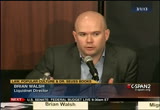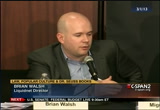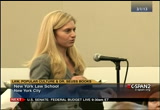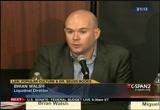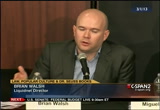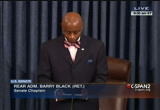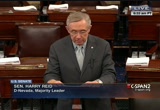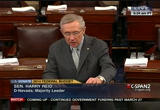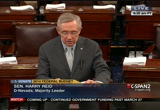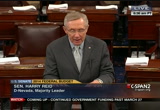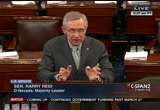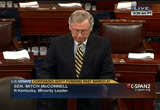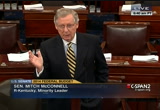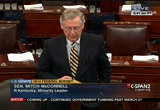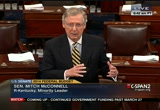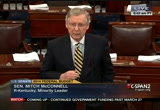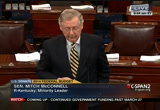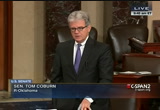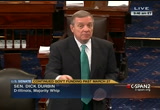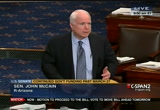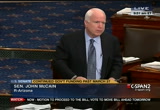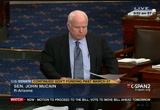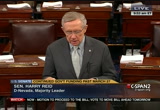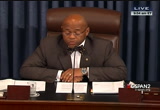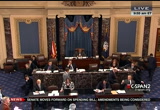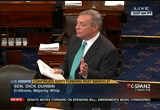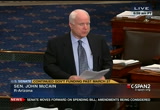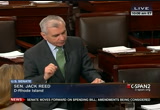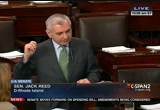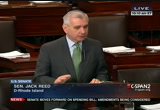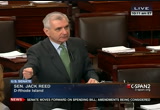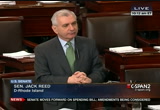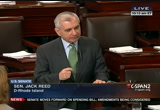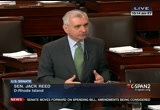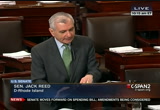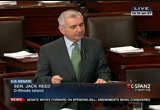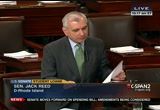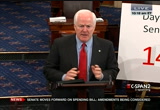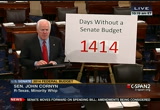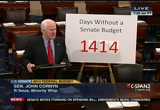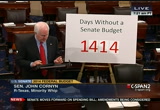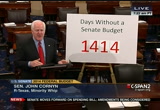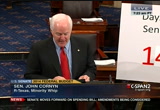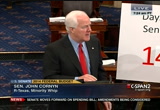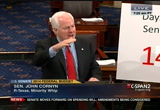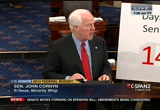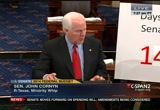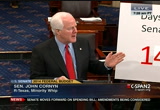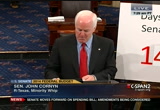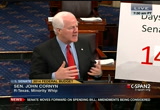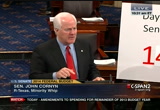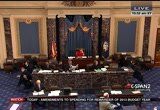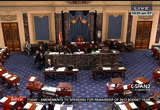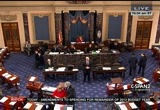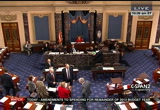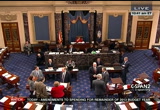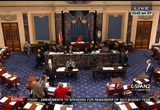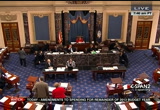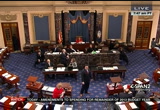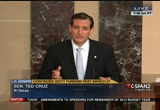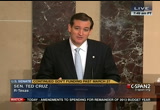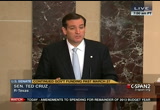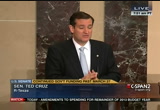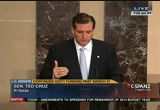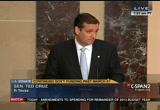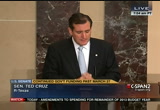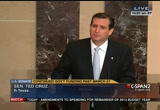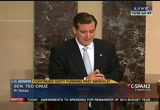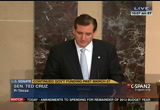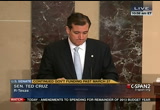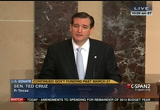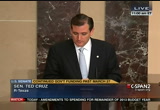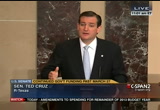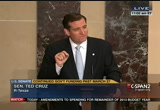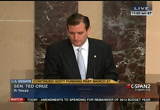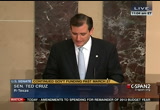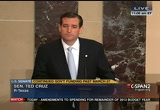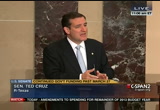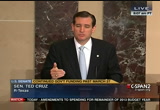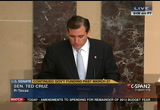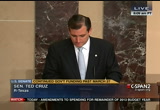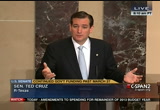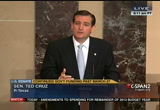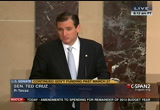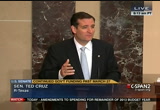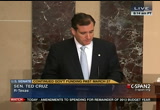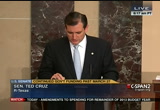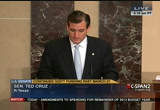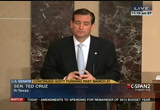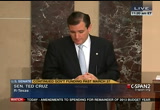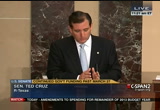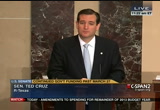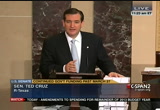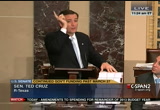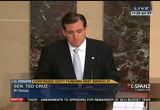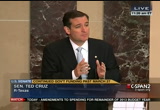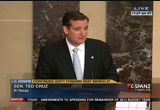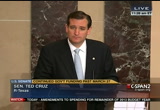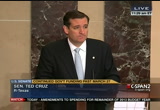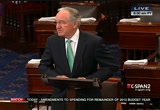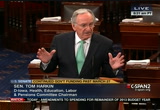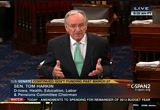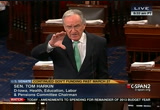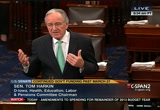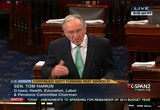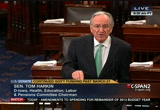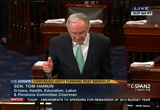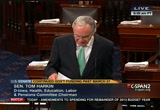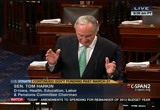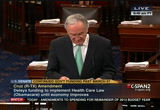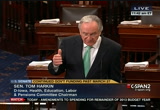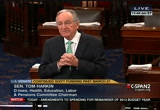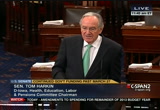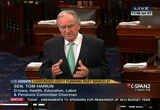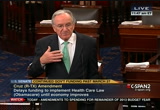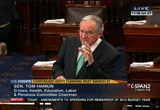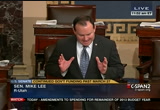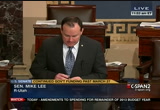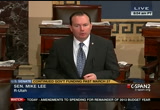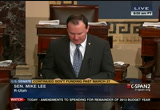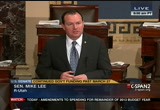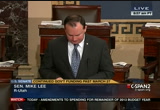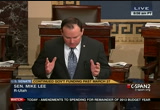tv U.S. Senate CSPAN March 13, 2013 9:00am-12:00pm EDT
9:00 am
their enormous capabilities they have at the disposal to take on big challenges? >> thank you. that actually also brings to my next question. the other thing that strikes me in the book "the lorax" in the request is not specifically asking the onceler to engage in corporate philanthropy. what he wants is the onceler actually integrate the sustainable principles to the core of the business. so to be clear, in your mind, what is the difference between corporate philanthropy versus something integrated to the core? and what powerful about integrating to the core? >> i think it gets to -- in my opinion, an outdated view of business in society that it's the company makes as much money as possible at, you know, at all costs. without understanding the impact
9:01 am
on the communities where it operates, the broader environment, and that it has a few feel good marketing campaigns, and philanthropic grant it is makes. really in the nature of pr or risk mitigation. but that it doesn't -- we need get beyond the outdated mentality you can make adds much money as long as you give a little bit away we'll forget about the danger and the externallalty you created. i think we need this notion of corporate impact, which goes beyond writing a check, and it goes to the heart of what a company has the capacity to do. in "the lorax," i really do think it's not -- as he said, it's not -- the lorax isn't asking the onceler to fund an
9:02 am
after school tree club for youth in the community; right. he was asking him to reconsider the fundamental business strategy, and the fundamental business purpose, and i think that's the kind of conversations we need. not how do we encourage more companies to give. how do we encourage more companies to have an impact? >> okay, alice. >> miguel mentioned one thing. he mentioned creating a system of feedback where we get feedback and advice is through boards. this where your expertise can help us. . >> so the board, of course, is ultimately responsible for the business, and with a roomful of attorneys and law professor. i'm sure you're familiar with the duty of care and loyalty. it's a to read your manual and
9:03 am
the responsibility related to being a good board member and the duty of loyalty. the duty to the company above your personal interest and that includes the conflict of interest for non-profit. there's an additional duty of obedience to the mission. and tamyra asked me to mention today my own concept of an additional duty of duty of imagination. ting fits here. which is what i think. so if the sneed business had a board and followed the duty of care and locality. they could follow their responsibility, they could have a good audit and follow every rule and regulation perfectly fine. there's little regulation related to ecosystems, in fact. and they could have no conflict of interest on the board. they can be doing their job perfectly fine. the question, the issue is here,
9:04 am
the duty of imagination, which is where do we see this business in the future? where are we taking this organization? what is the greater potential in the future long-term versus short term. and businesses today, the more successful future looking businesses, the ones who being he recalledded are the ones thinking about the longer term future of the company and the world, and seeing them as interdependent and interconnected, and mutually interdependent. that's the concept of sustainability. so companies today kimberly clark, knick -- nike wondering how sustainable their business is. and they are making serious changes. and "the lorax" is the perfect
9:05 am
example how they are seeing their businesses. many companies have a achieved sustainability officer and calling it sustainability and innovation. nike's new watch word is that they are decoupling growth from scarsty in resources. that's just perfect for "the lorax." the chief sustainability office spoke last week at clinton global initiative and said again and again and again, we're decoupling growth from scarsty of resources which is exactly "the lorax's" issue. growth, growth, growth, growth, but scarcity of resources destroy the business. what nike is doing, we cannot continue to make our products out of resources that are increasedly -- increasingly scarce with a world population growing from 7 to 9 million
9:06 am
people, with our moving forward using 1.5 -- one and a half times the planet's resource which is the direction we're moving in. it's unsustainable as a business model. so looking to the future, and what nike is saying to their supply chain and to their r&d people is find other materials by which we can make our product. they are already coming up with footwear already out on the market that is made from fibers that are not -- that are not used from natural resources, and that are sustainable, you know, that don't deplete the natural environment. so they are already moving forward the sustainability and innovative approach. you hear the term innovation.
9:07 am
i'm sure you already have. i think we're seeing businesses that understand that. those are the leaders and there will be followers. so in terms of board composition, i think actually an interestingly, and this is, i think, since the fall of the banks issues we're seeing an increase of very stark increase in a number of attorneys on board of board of directors with an increase in attorneys and financial people on boards, you wonder if it's going in the wrong direction. no disrespect to the audience, but it's not about due diligence, it's really about imagining the future, and maybe more i diversity of background and perspective on boards in thinking about the future of a business and sustainability.
9:08 am
>> so one phrase you hear thrown around a lot when it comes to boards, and just corporations in general, is everybody pushing for moving beyond compliance. as you pointed out, they are bringing people on board who are about compliance. -- first of all with it's beyond compliance with the imagination. >> yes. i think -- and i hear it again and again from boards, they are so busy checking off the boxes, there's no time for strategic planning, and i think there's also a great deal of attention to return. it's companies like kimberly clark who are saying we don't really want to be guided by the quarter earnings reports. we are trying to get our investors to think beyond that. that's a hard push for that. yeah, that's beyond compliant. >> okay. and if you can really speak, the guy at the end. i think he would probably say
9:09 am
why are we here? why do we need like a panel like this? i don't exist anymore. to me, the issues are clear. i guess let me open it up to audience q & a. >> can i say something on that? >> it's because the word at the end. unless, unless we do something about this. >> unless. >> and this is our opportunity. >> yeah. >> just on that, what you say, miguel, to your point the book idea in response to milton free mono. in the past views who had the views that won snout. >> -- doubt. >> a lot of you in the room -- end of history for corporate law in 2001, and ironically since then there's ban lot more debate about whether this particular ideology is suitable for durable
9:10 am
capitalism. so, you know, some people in our dialogue that we have organized have actually brought up the point that the last thirty or forty years are the historical admiration of ideology around corporations. and so while, you know, we concede adds a foregone conclusion that's it's a natural law about businesses, it's really an aberration, and that's something to keep in mind. someone else pointed out a number of times in our dialogues that csh several people now have started to point out including lynn about literally the number of public corporations in the u.s. since 1997, has dropped by more than a half. so the corporations one way to organize business activity, and i'm sure, again, many of you know of the various business forms and ways to legally structure them.
9:11 am
the united has been particularly dependent end end on the one form for a long time. we may be seeing a shift away from that. that particular form. it's not going we're going forget how do business. there might be better ways to do it sustain belie. ly. i want to followup on the threat. i think we have seen with the decrease in public companies we have seen the growth of private companies too, especially you think of web 2.0 companies that are choosing to remain private for longer. and a lot of reasons the ipo market is not as -- hot and capital markets are not as hot and they can get the capital from other investors without going public. you have the founders who are passionate and they have a vision, they want to have their interests in long-term value creation in a way that being a publicly held company is sometimes at odds with their
9:12 am
objective. i think that i'm hopeful that in the coming years we'll see more and more of these companies adhere to the values of long-term value creation. especially companies coming out of silicon valley, there's etho embedded in it. the investors share the values and there's a nice alignment of incentive there. so i'm hopeful we'll see it as a positive trend. >> candidate? >> thank you for being here and the last comments directly treat where my question was going. and kind of how we can expand the lens of how we view the businesses as mr. walsh. specifically, when we're looking at the new -- like i said, i question twofold. when we look at the ten i cough rptions being formed, flexible purpose corporation, for example, are those first you see those as ways that can corporations are starting to
9:13 am
kind of take hold of their role in society? and try to move it forward, and is that something that can be effective? and then also, is there a way other than for public companies to kind of help shift away from the fanfare that is around the quarterly earnings report and what happens in order kind of focus on imagining the future, as you said. >> thank you. >> well, i guess to your second question about how do we essentially get there? how do we change alignment of incentive? i think it comes down to agency both individual and collective agency. so i think as individuals, we sometimes forget the agency that we have as consumers, as investors, as people who are consumers of a bank, as employees, as managers.
9:14 am
and so, we are the people of corporations; right? and we are voters who put in place legislature that put in place regulations for the corporate form. we have a lot of agency as individuals with the individual choices we make about where we work and where we invest and shop, but we also have the ability to organize and to do collective action. i think one of the things as we have seen separate trends of shareholder advocacy, banking advocacy, we have seen, you know, consumerred a vote --ed a have advocacy. i think not enough connect the dots and realize the full compliment of resources and power that we have as individuals and how to we connect, you know, a lot of us live in a world where we say, okay, i'm going give to the
9:15 am
non-profit over here. i'm going work for the company over here and put my money in some mutual fund or some investment over there and i'm not going to connect the fund i'm investing in might be investing companies that go against my best interest of employee with this organization and contrast with the work i'm doing or the advocacy i'm doing with the non-profit. i think we need to have greater awareness and do a better job of connecting the dots for ourself about the impact of the different points of leverage. [inaudible] yeah. >> i think the flexible purpose corporation b. corp., the newer form are -- they are interesting. but i don't -- you know, they are part of changing narrative, i suppose.
9:16 am
one thing though that we shouldn't overlook is the fact that even as the laws stand now, even as with the current structure of public corporations, a lot of companies can and do kind of shirk the quarterly purity. and part is, i think, building the capacity of other business leaders to figure out the right metric to use as public corporation. how to incentivize people and view their own company's purposes. there's a lot of big companies -- they're not run very well. and but, you know, they are companies out there mainstream companies, not like tree hugging companies, you know, if you look at costco, proctor and gamble, and ge, southwest airlines, a lot of these companies that are main -- mainstream. even walmart doesn't produce eps
9:17 am
forecast quarterly eps forecast. i think part is gnarlizing -- normalizing the behavior. i think a lot of business leaders feel like they are going on a limb if they decide drop quarterly earnings forecast, for example. there are loads of companies that -- 35% of the public companies don't provide quarterly earnings forecast. we have to think of what can be done within the corporate form. >> i have an issue with it. i don't understand its purpose or role. we have non-profit structured for non-profit, there's a structure for-profit corporations, and and, you know, there a whole movement of us working with for-profit to encourage and help and support them in reporting on social and environmental impacts as well as financial impact what the gri
9:18 am
report and a whole host of reporting now that they're producing for the general public and being encouraged to be accountable and to be competitive along the lines. so why would there now be yet another kind of corporation that is supposed to encourage accountability on all three scores? it seems to go against the current movement to encourage for-profit to be accountable on the scores, and the structures exist already. so i don't see a place for it. i think it's going to create a great deal of confusion down the road for people who invest with them. >> i'm generally with they can. i struggled hard since it came up. in my mind, regular corporations, right, they want to do this, they do it -- they
9:19 am
have a business judgment rule that is going protect them as long as they characterize and link to the long-term value they are generally fine. it was literally two weeks ago maybe the only difference for the is in you get sued. you can sue them for failing to do the esg things. that would be a breech of the duty. you couldn't sue a corporation directly for this. you have to link it to breach loyalty. it seems to become an -- in the day-to-day running of the business, i fully agree with you. i'm not sure what the difference is. >> i think there's a point that alice alluded to is that it does san diego -- san diego mixed signal we have the form for the companies that want to do some
9:20 am
good for society. and then everyone else you are off the hook. that is potentially very dangerous. >> and -- okay. i think that reliance on regulation may be a little disingenuous as reliance on shareholder and consumer choice given the power of advertising dollars with messages. i think choices remarkably con trained and the hopeful as dr. seuss' messages are they seem to exist on a different level from what it is that needs to be done. i'm particularly in countries other than the country in which the corporation has headquarter, there are a lot of serious, serious problems. b. corps are little guys. at least they have a mandate that allows them and requires them to do something that other than what corporations are actually required to do.
9:21 am
there is some differences between canada and the u.s. in terms where corporations loyalties most strongly lie. we are a little bit open about goals beyond shareholder driven goals. note by a whole lot. but there's a piece they enjoyed. it's sort of in a way the ending of the paper. if dr. seuss observes that children's literature has a greater probably for evil than the other form of literature. he said that was then, a long time gone. he was writing about the cat and the hat one of the cold war's most unguided missiles. now we have something different. we have anything goes without the spirit. transgression, deconstruction or praise bestowed as structure and order once were. without the spirit of the relationship there's little aspect of assumption.
9:22 am
that's my comment. and he said a million cats can work frantically for the attention. what choice did the fish have and joy consumed. children do to the tune 18 media hours a day. the media that are watching and consuming and playing with is corporate media. for-profit corporate media, in their own spending, the money they have to spend in the united states $21.4 billion a year. $500 billion a year by parents. much driven by pester power, which is manipulated by far more powerful writers than dr. seuss or any of us putting the messages together and helping children control the spending of $500 billion and control the spending of $21 billion.
9:23 am
i don't i have any kind of answer for this. i just think we're unware of the sea in which children swim. dr. seuss has a touching thing. the child clinging to the tree as he watches the egg shape bombs. the choices that he leaves to the child to the end of the books. children have less choice than we do. they are the most learners on the plan pet. they are observing the stuff true the pore. from the time they are born and dressed in designers suit. i'm wondering how corporations are addressing this kind of question. how many pieces of clothing do we need when other children in other countries are being tourture -- tortured to make the clothes. it's a bigger problem than i think corporate regulation is addressing. and it's a much bigger problem that night individual consumers or consumer-driven groups can address. i think it's gone beyond any
9:24 am
kind of controls. and i just wonder if there's some kind of place to go, i mean, b. corps are right now are cute and boutique. they probably aren't going carry the day. they are a little step in the direction. i would put no money on this in term of if i was betting on what succeeds. i'm saying i don't think that the corporate -- i'm a bit more of a drawback than in the way that, you know, the money they get for scholarship to sit in schools and putting logo in classrooms and so on which say that have been doing for a long time is more like drug lords in colombia buying villages so nobody will campaign. people in drug villages have a wonderful life compared to others. that's really, i think, a question. i hope it's a question. okay. >> is the question what to do? >> yeah. what can be done. how can we explain it's a lot bigger and needs attention? >> i think this is what you
9:25 am
described ena -- encapsulates it's a systemic problem. there's not a single corporation solution or regulatory solution. it's a big system problem that's been developing for a long time. i think as we are thinking about corporations, we should think about very seriously even downtown most foundational understanding of corporations really what their role is. in the system and we need praise them in the -- place them in the context and stop kind of framing them as existing in the alternate universe. i think, you know, this is the corporation is part of a much broader system needs to be corrected. >> agreed. we have time for one more question. you're right, the corporation that's it exactly. they are part of one broader ecosystem.
9:26 am
they don't exist unless the society grants them to exist. and your question, brian, the individual agency in all of us. like,ed at some point we have to make a choice. in the case of kids and parents you have to provide that choice. this is why my kids think dried cranberry are candy. they have no idea. they have no idea there's real candy. [laughter] >> it's about choosing healthy over unhealthy. it's about choosing or understanding in the sea which we live. and this is kind of driven by a conference. i don't want to take up time. put on but vulnerable work shoip out of atlanta that i attended at ubc and called "corporate rights versus children's interest." anybody from canada is near the field, will drive you through the roof. why do -- corporations have
9:27 am
rights and children have interest. >> we have a question over here. what is your question, please? >> the only specific example that was given in the panel about what corporations can actually do to effect the concepts you have been talking about, which i think are terrific with nike and looking far different sustainable raw material for the products. and you see a lot of environmental stuff for corporations green buildings and, you know, that kind of thing. one of the part of the environment of the corporation is the employees. with the idea of maximizing profits part of the way -- that seems to pay as little as you can. not -- and there's been a lot of corporate activity and lobbying from corporate groups like alec
9:28 am
and the chamber of commerce to eliminate unions from our society, that's the way i see it. i'm wondering for any of these miewmplets that you're -- miew.d that you're referring are if there's any possibility that would actually take a different view about the employees the employees are valuable and need to be sustained, and protected in the same way that perhaps trees need to be. >> in terms of employees as a voice, . >> employees and beneficiary of corporations when you have billionings of collars in profits and you pay your employees $7.25 an hour, perhaps you might not need to maximize the profit to that extend in order take care of your employees. i think they need the care as much as the treated co. >> thank you. can i make a quick comment. >> sure. >> i agree. ting speaks to what alice
9:29 am
referred to as the short term and long-term tensions. one of the big challenges today with the globalized companies they outsource, i mean, they're not employee employing as many people, actually. they are outsourcing to smaller employs. just a couple of minutes left. you can see it the entirety by going to our website c-span.org and look in the the c-span video library. the u.s. senate about to gavel in this morning to continue debate over funding the federal government through the end of the current budget year. current spending authority runs out on march 27th. the house passed the version a week ago today. the senate is working on the version and once the senate passes the bill, the house and the senate have to work out a comprise. senators have a vote scheduled for tomorrow morning to move the bill forward, and begin considering amendments. and now to live coverage of the u.s. senate. here on c-span2
9:30 am
9:31 am
of the hearts of our senators, enabling them to feel the power of your presence when they need it most. may they find opportunities to trust you even in the midst of trouble. lord, bring them through the difficulties of our times as gold tried in the fire. help them to be healing agents as they exemplify for the american people civility, graciousness, and oneness. let your spirit guide them moment by moment, keeping them close to you. we pray in your sacred name. amen.
9:32 am
the presiding officer: please join me in reciting the pledge of allegiance to our flag. i pledge allegiance to the flag of the united states of america and to the republic for which it stands, one nation under god, indivisible, with liberty and justice for all. the presiding off icer: the clerk will read a communication to the senate. the clerk: washington d.c., march 13, 2013. to the senate: under the provisions of rule 1, paragraph 3, of the standing rules of the senate, i hereby appoint the honorable william cowan, a senator from the commonwealth of massachusetts, to perform the duties of the chair. signed: patrick j. leahy, president pro tempore. mr. reid: mr. president? the presiding officer: the majority leader. mr. reid:, mr. the senate will resume consideration of the motion to proceed to h.r. 933, the continuing resolution
9:33 am
legislation. last night i filed cloture on the motion to proceed to this most important legislation. we're now in the midst of another filibuster. another filibuster. and if no agreement is reached, the cloture vote will be tomorrow morning. mr. president, yesterday americans got their first look at this year's ryan republican budget. it turns out it looks like last year's ryan republican budget. and it wasn't the only one -- i wasn't the only one that said gee whiz, not again. here's the headline from "bloomberg news: "-- quote -- "ryan budget replays republican hits." one "washington post" reporter compared the release of the not-so-new and certainly not improved ryan republican budget to the movie "groundhog" day where bill murray relives his least favorite holiday over and over and over. remember, this is the third ryan
9:34 am
republican budget. this is what the "washington post" also wrote -- quote -- "the unrepentant reprisal of the same fiscal vision that was decisively repeated last fall is bound to attract notice." indeed, this is the same budget plan we saw from congressman ryan last year and the year before that. even the name is the same. if anything, this new version is even more extreme than the last two ryan republican budget proposals, proposals that sought to end medicare and raise taxes on middle-class families all while handing out more tax breaks to the wealthy. the ryan republican budget is anything but balanced and it reflects the same backward value americans rejected in november. instead of asking the wealthiest to contribute their fair share, the ryan republican budget demands middle-class families pay more in taxes.
9:35 am
instead of ending wasteful corporate tax loopholes, it basically ends medicare. in fact, the ryan republican budget takes special aim at health care. it would eliminate free preventive health services for 34 million americans. the ryan republican budget would increase prescription drug prices for seniors by $2.5 billion in one year. it would end the coverage guarantees for 3.1 million young men and women on their parents health plans. the budget would end coverage for mammograms, cervical cancer screenings and contraception for more than 47 million women. and it would allow insurance companies to deny care for 17 million children simply because they were born with a heart defect or some other illness. these drastic cuts will literally cost lives and also jobs. instead of a balanced approach
9:36 am
that protects the american economy, the ryan republican budget guts education, medical research, infrastructure and even public safety. the ryan republican budget would actually jeopardize the economic recovery. it wouldn't help it. and in case you're thinking it -- huge and painful cuts can buy an awful lot of deficit reduction, think again. instead congressman ryan's cuts will buy more tax breaks for the wealthiest among us. this budget isn't a serious attempt to reduce the deficit. meaningful deficit reduction will require shared sacrifice, including contributions from those who can best afford to contribute. today budget committee chairman patty murray will introduce a budget that reflects the principle of balance. senator murray's plan, the democratic plan, will cut wasteful spending, reduce the deficit and close tax loopholes that benefit the rich. and it will invest in the things that help our economy grow:
9:37 am
education, preventive health care, worker training, roads and bridges. it will invest in a strong middle class. and unlike the ryan republican plan, it won't leave you wondering if it's groundhog day all over again. mr. president, as things now stand, we're in the midst, as i indicated, of a filibuster to even try to get on the bill, if we get on the bill tomorrow morning, then we have 30 hours waiting around staring at each other. and i just alert everyone we have our easter recess coming a week from friday, and we're not going to be able to do that. the budget has a locked in amount of time, 50 hours plus the vote-a-thon. so everyone should be prepared to change their plans the first few days. we hope it's the first few days -- of the easter recess. we are not even on this bill.
9:38 am
and that's such a sad thing. it was such a -- i thought it was such a, really a good atmosphere here, that we had a bill in a decent time from the house. as i kaeulted yesterday, i -- as i indicated yesterday, i didn't like everything in that bill, but we had senator mikulski and senator shelby working together. they checked in with me and senator mcconnell to let us know how they were doing, and they did well on their own. they didn't need our help. and they came up with a plan that was fair and as balanced as could be under the sequester situation. and it was bipartisan. the amendment that is being filibustered is sponsored by mikulski and shelby. so this is a real shame, mr. president. i said last week when we were going on to this bill that we would have opportunities for amendments. i just hope that we can get on the bill, have some amendments offered. but each day that goes by -- and we've wasted two so far -- we're
9:39 am
unable to have the amendment process. we had yesterday waiting all day, harkin and cruz because that's the first democratic amendment, the first republican amendment. there are still -- they are still on deck waiting to come whenever the umpire says that we can go fire. umpire being one senator saying we can go forward. mr. mcconnell: mr. president? the presiding officer: the republican leader. mr. mcconnell: four years. four long years. that's how long kentuckians and americans from coast to coast have had to wait for senate democrats to perform their most basic of legislative responsibilities. later today we hope that long wait will come to an end when they finally release a budget plan. given what we've heard about the budget so far, it's obvious why they've refused to release one for so many years. we hear it won't prevent
9:40 am
programs like medicare from going bankrupt. we hear it contains yet more wasteful -- quote -- stimulus spending, spending that turns out to be a lot more effective for generating jokes for late-night comedians than jobs. in order to finance more spending we hear it relies on more than $1 trillion -- that's a trillion with a "t" -- in new taxes, including on the middle class. remember, washington democrats already got more than $600 billion in taxes this year. so where's this new revenue going to come from? charities? the home mortgage interest deduction? will they go after families and small businesses yet again? at least there's one thing we almost certainly know. their budget will never balance.
9:41 am
not today, not tomorrow, not ever. if that was my vision for the country, frankly, i'd want to hide from the american people too. look, a budget like that would be an unmitigated disaster for our country. it would betray those who are going to need medicare when they retire. it would betray the younger americans who would be forced to grapple with the consequences of democrats' failure to get serious about the debt. it would betray the hardworking middle-class families that simply can't afford higher taxes, especially in the obama economy. and if that's really the kind of budget senate democrats plan to offer, it would sacrifice america's hopes for sustained economic recovery at the altar of higher taxes and bloated,
9:42 am
unaccountable government. it would also draw an important contrast with the budget republicans put forward yesterday. because here's the thing, republicans believe we should be growing the economy, not the government. growing the economy, not the government. and the house republican budget reflects just those priorities. it's a budget that does something else too. it actually balances. it actually balances. that's important for a number of reasons, not the least of which is that it would help unleash economic growth and bring down our country's massive, massive debt load. interest payments on the national debt alone are set to exceed everything we spend on defense. interest on the national debt is going to exceed everything we spend on defense in just a few years' time. so the path we're on is clearly not sustainable. with that in mind, i hope
9:43 am
democrats will offer something serious today rather than what i hear may be the case. i hope they face up to the fact that they already got the revenue they're going to get. they already got the revenue they're going to get. so they can start dealing with the real issues that are leading us to fiscal ruin. i hope they'll finally stop trying to shield the washington establishment from every single attempt to eject a little more accountability and reform because if the reports i've seen are correct the budget they plan to offer would do none of these things. it would only speed up the dangerous trajectory we're on rather than change it. entrench government waste and cronyism rather than route it out and make things worse for the families we represent rather than giving them some hope. and hope is something the american people really, really need right now. they have been battered by the president's economy. they're tired of seeing their money wasted on endless
9:44 am
labyrinth of self-perpetuating bureaucracy. so i'm calling on my democratic friends to shelf the extremist liberal budget we've been hearing so much about. why don't we get serious here and start doing the things necessary to make government more efficient, more progrowth, more responsive and more compassionate. in other words, enact the same priorities republicans have and, frankly, the priorities most of our constituents have too. after four long years, senate democrats should be willing to do more than just protect their buddies in government at all costs. to offer americans something better than a budget that would expand the i.r.s. and crush the middle class. the american people deserve better than that. haven't they waited long enough already for true growth-oriented reform? mr. president, i yield the floor.
9:45 am
mr. coburn: mr. president? the presiding officer: the chair will make a statement. under the previous order, the leadership time is reserved. under the previous order, the senate will resolution of the motion to proceed to h.r. 933, which the clerk will report. the clerk: motion to proceed to the consideration of calendar number 21, h.r. 933, an act making appropriations for the department of defense, the department of veterans affairs and other departments and agencies for the fiscal year ending september 30, 2013, and for other purposes. burn mr. president? the presiding officer: the senator from oklahoma. mr. coburn: i just wanted to make a few comments. we have finished our analysis of this bill fl it is 58 pages. it is well over $is trillion. we finished last night about 9:00. we have no objection to moving on to the bill, if there is a fair and open process. we'll be hay to submit our idea -- we'll be happy to submit our ideas to the chairman of the
9:46 am
appropriations committee and the ranking medical. but there is a lot we ought to discuss about this bill. there is no attempt to filibuster the bill. there was an attempt to do our jobs, which is actually read the bill and see what's in it and be prepared to offer constructive criticisms to the bill. so with that, i'll be back on the floor in a little bit when the managers of the bill come to the floor if they witnes. if they witnes want to offer a unanimous consent to move tonight bill, i'll sure there will be no objection. mr. durbin: i respect my friend from oklahoma. we have worked on many things together in a bipartisan basis, and i respect his right as a senator, maybe his responsibility as a senator, to speak on issues that he thinks are important to our nation and his home state and to offer amendments, if that is the appropriate approach that he
9:47 am
wants to use. we've wasted a day, though. we've lost day in the united states senate. yesterday was the day to begin the amendment process, and we couldn't. senators objected to our coming to this process and even offering an amendment on the continued resolution, which is the federal budget for the remainder of this year. in other words, until september 30. we know that we are just days away from the continuing resolution expiring. we don't want the government to shut down. we do want to fund the government. we neewe understand there must e spending cuts and there's a healthy difference of opinion on where those cuts should be made. the senator from arizona was on the floor yesterday and we spoke of this. one aspect of this bill, which i would like to address for just a moment, is the department of defense appropriations. this is a new responsibility, which i have in the senate appropriations committee, and it is an awesome responsibility.
9:48 am
not only are we dealing with the security of the united states of america first and foremost, we are dealing with a massive spending bill, larger than any other spending bill in the federal government. now, last week -- last week the hart passed a continuing resolution which covers the department of defense for the remainder of this year. l, many changes are included in there, but that was done, as was the military construction budget and the veterans administration budget, all finished last week, all sent to us by the house last week ready for us to address if we care to. well, we had that chance yesterday and we didn't. now we have another chance to do and we should take it. we have a lot to do in a limited amount of time. we have this week and the next to accomplish not only the passage of this federal budget for the manyder o remainder of r but also next week to
9:49 am
considering a budget resolution for spending into the next year. senator harry reid, the democratic majority leader, has come to the floor expressing some frustration. he wanted to move on this continuing resolution this week, as early as yesterday, giving members an opportunity to offer amendments. several members stepped forward and were prepared to do so, but they were stopped. there was a hold. and now, as i understand from the senator from oklahoma, and i believe my friend from arizona may echo his remarks, they're prepared to not stand in the way of any amendments, if members wish to offer, they can, and i hope they will. let me say a few words -- mr. mccain: since my friend is on that subject, could i -- mr. durbin: i ask permission to engage in dialogue with my friend, the senator from arizona. the presiding officer: without objection. mr. mccain: you'd say to my friend from illinois, there is no further objection. the senator from oklahoma and i have reviewed the bill and we
9:50 am
discussed yesterday about its length and our obligations to -- i promise my friend from illinois, i won't rehash that discussion we had. but we have no objection whatsoever to taking up amendments right now and moving forward with that, and i hope that that is perfectly clear to all members. and i'm eager, very frankly, to move forward. and could i mention to my friend from illinois, i appreciate the new responsibilities he has. i appreciate the difficulties of addressing, as he just said, the largest single part of our appropriations bill is in the defense authorization, but in the intervening time that we had requested, i came up -- for example, $65 million for pacific coast salmon restorations for states, including nevada.
9:51 am
we're going to restore salmon restoration in the state of nevada? department of defense overpay contracts by an additional 5%, totaling $15 million, to contractors who are native hawaiian-owned companies. i would be glad to include this long list for the record. $993,000 in grants to dig private wells for private property owners. $10 million for usda high-energy cost grants programs that go to subsidize electricity bills in alaska and hawaii. $5.9 million for economic impact initiative grants. the list goes on and on, i say to my friend from illinois. so we were trying to examine this legislation, the 587 pages or whatever it is, to find this kind of thing. and it was our obligation to do so. we have found these things.
9:52 am
we're still finding additional elements. and, i mean, some of them -- when we are talking about -- and i see the distinguished majority leader on the floor, my old friend. we are read to move forward with amendments. i was just saying to my friend from nevada, we found numerous additional provisions in this legislation that we think is important for debate and discussion, and i won't go through all of them. $120 million for guam, the national guard star-based youth program, $5 million. $154 million for alternative energy resource -- on and on, while we have ships that can't leave port, plain, planes that t fly and men and women that can't
9:53 am
equip. and we have this kind of stuff on aeption pros bills. so i want to ensure my colleagues that the senator from oklahoma and myself yesterday finished examining this bill. we are prepared to move forward with vigorous debate. if there is in misunderstanding about that i apologize to the majority leader and my friend from illinois. mr. reid: mr. president? the presiding officer: the majority leader. mr. reid: as i said yesterday on the floor, i have nothing but the highest respect for my friend from arizona. i know that he looks into things very deeply, and i appreciate his peacemaking. even though he's a famous man in america and the world because of his wartime experiences, he's also a peacemaker. and i'm grateful to that. so i ask unanimous consent the motion to proceed be agreed to. the presiding officer: without objection. so ordered. mr. reid: on behalf of senators mikulski and shelby, i call their substitute amendment, as modified, which is at the desk.
9:54 am
the presiding officer: the clerk will report the amendment. the senate will proceed to senate h.r. 33, which the clerk will report. the clerk: dore calendar 21, h.r. 933, an act making appropriations for the department of defense and so for and for other purposes. the presiding officer: the clerk will report the amendment. the clerk: mr. reid for ms. mikulski proposes amendment numbered 26. strike all after the enacting clause and insert in lieu thereof -- mr. reid: mr. president? the presiding officer: the majority leader. mr. reid: i withdraw the cloture. the presiding officer: cloture motion is withstand. mr. reid: mr. president, with the first two amendments we're going to do on this bill, according to the two markers and they're the -- according to the two managers, and they're the
9:55 am
ones running this program here, are the amendments of harkin and cruz. if harkin is not available immediately, cruz can do it. but these are the first two amendments and i would ask both of them to come to the moore at the earliest -- to the floor at the earliest possible date ... in fact, soon. the two managers, senator shelby will be here shortly, senator mikulski will be here shortly. in the meantime, i suggest the absence of a quorum. the presiding officer: the clerk will call the roll. mr. reid: mr. president, i would withdraw that. i didn't know that my friend, the distinguished senator from illinois, was here wanting to talk, which is a rare occasion. mr. durbin: mr. president? mr. mccain: mr. president, could we continue the dialogue? the presiding officer: without objection. mr. mccain: mr. president, i want to thank the majority leader before he leaves the floor, and i look forward toempt as and debate. and, again, i apologize to all
9:56 am
my colleagues if we held up this legislation, but we did want time to examine this legislation as we had previously requested. i thank my colleagues, i look forward to moving forward with amendments. the senator from oklahoma and i are prepared with amendments whenever they are in order. and i thank my friend from illinois, and i appreciate the enormous responsibility he has in his new position. i thank the senator from illinois. mr. durbin: thank my colleague from arizona as well. and i think we have a rare moment of peacemaking and harmony in the senate, and it may not last for long, so i want to speak while we have that moment. and just say for the record, i don't dispute any of the statements made by the senator from arizona, nor do i question his right, even his responsibility, to raise questions about spending. we're at a time when we're cutting spending right and level, even this the department of defense. but i do want to put on the record the following: this bill, which we're
9:57 am
considering, as it relates to the department of defense in its entirety is the bill that was passed by the house republican majority. this is not a bill which was written on this side of the rotunda. we have received it. that doesn't mean that we shouldn't ask questions about what the house did, but i don't want to be assigned blame or asked to take responsibility for provisions which i really did not author. we took the house version and brought it to the floor in an effort to bet this moving in an dosh get this moving in an expedited manner. i know some of the questions that the senator from arizona arhas raised are not new. there was a long-standing debate in the senate about whether to expand the notion of native contracting to include native alaskans and native hawaiians. senator inouye who chaired it
9:58 am
and unfortunately passed away a few weeks ago believed that the minority status for contracting should include their native tribes people and they fought for it, and it was included, and i know the senator from arizona perhaps took dpoaption that and debated with them. to renew debate is appropriate but it is not a new provision in the bill. it is something that has been there for sometime. i welcome the debate. i think it is an important one of the you about i wanted to say that for the record. this is the house republican bill, and the measures which i senator from arizona raised, some are new to me. i am going to have to look more closely, and i should, to find out the merits of the provisions. before we go any further, without -- mr. mccain: could i respond briefly? mr. durbin: if i could just use, any time that we use now until the managers arrive on the floor be for debate only. i ask unanimous consent toker
9:59 am
that purpose. the presiding officer: without objection. mr. mccain: i understand it was what came out of the house, the defense portion of this bill. i had no assurance that that was going to be -- quote -- "preconference" and that was going to be the final bill. so to expect me to examine the house-passed bill without knowing exactly what the disposition of it would be on the senate side is, i think, a little of. but in the intervening tiernlgee senator from oklahoma and i have found provisions that have nothing to do with the defense bill. $65 million for pacific coast salmon restoration for states including nevada. i know there are rivers coarsing through nevada all way to the pacific ocean. but grants to dig private wells for private property owners -- so we have a list of provisions that we were able to uncover, which we find controversial and
10:00 am
should be open for debate and discussion. but it's over. we're moving forward. hypocrite that thi hope that the amendments have been made in order will come to the floor, we can debate and vote. i thank the senator from illinois, and i yield. mr. durbin: mr. president, i see my friend and colleague from the state of rhode island here, who serves on the defense appropriations subcommittee and as well as the armed services committee. i'm going to yield he to him next. but i do want to say a word about the department of defense appropriation contained in this bill. this act provides $604.9 billion, including $87.2 billion for overseas contingency operations. it is a reduction from the 2012 level of $633.2 billion. there are no changes in the bill that passed the house last week. the bill fully complies with the spending caps in the budget control act. it contains no member-requested
10:01 am
earmarks in compliance with the earmark moratorium. congress has cut the defense budget to find programs which we believe are excessive to accommodate the scheduling delays, budget errors and unspent funds. the bill bill includes 671 cuts in the budget request for funds not needed for the remaining of the year. i believe everyone should agree with the notion that if you're going to replicate last year's budget, you're not going to build the same ship twice. so we are trying to avoid those obvious misappropriations and waste of federal tax dollars. the bill also rescinds $4 billion in unspent prior-year appropriations from 87 programs that have been delayed or terminated. there's been talk in the press that defense appropriations bill included here gives an advantage to the pentagon when it comes to sequestration, but that is not true. until this bill is enacted, the
10:02 am
defense department is dealing with two challenges: sequestration and the threat of the defense being under a full year of a continuing resolution for the first time in our nation's history. the bill does nothing about sequestration. this bill. nearly $42 billion in defense cuts have already been ordered by the president, and this bill does not change that at all. some people think the defense is being afforded special treatment in being able to transfer money to deal with sequestration. in fact, this bill keeps a tight rein on the pentagon's transfer authorities. the bill actually provides less transfer authority than what the defense department requested in february of 2012. the defense department asked for $5 billion in general transfer authority. the bill allows $4 billion. the defense department asks for $4 billion in transfer authority from overseas contingency accounts, and the bill provides $3.5 billion. all of these transfer authorities are subject to congressional approval processes. the perception of this bill gives the pentagon excessive
10:03 am
flexibility to deal with sequestration is not correct. the other challenge facing the department of defense is the threat of a year-long continuing resolution if we fail to pass this bill. a bill that would do nothing more than extend the authority of last year's spending bill. some of the department's most pressing fiscal challenges relate to trying to live in today's world using last year's budget. passing a defense bill will give the pentagon relief from the threat of living under a full-year continuing resolution for the very first time. but that's not because of flexibility. that's because an appropriations bill is a better steward of taxpayer dollars than a continuing resolution. here are five reasons why a continuing resolution would be harmful to our national defense: readiness. readiness is the way to measure whether our troops are properly trained and equipped to do their mission. under last year's funding bill, operation and maintenance accounts would be underfunded by $11 billion. in other words, if we just took last year's bill, we would be short $11 billion in preparing our troops for battle.
10:04 am
i will tell you that readiness, these operations and maintenance accounts which result in readiness training means survivability for our men and women in uniform. it is just that basic. that directly translates into less training if we don't do something about it and delayed repair of equipment. every member of the joint chiefs of staff has warned us that readiness is on the verge of plummeting because of fiscal uncertainty. that is disgraceful and unacceptable. and once readiness goes down, it takes years to rebuild it. spending on unneeded programs is also a concern. continuing last year's bill would fund $17 billion worth of programs that are no longer needed. specifically, 31 programs that have ended. for example, a continuing resolution would provide $2.6 billion for mrap armored vehicles. the pentagon already bought these vehicles. and with our troops beginning to draw away from afghanistan, we don't need more at this moment. this bill would not provide funds for unneeded programs like
10:05 am
this. third, no new starts or multiyear authority. a extension of last year's bill would extend the prohibition on new programs and multiyear contract authority. a multiyear contract must be specifically authorized by law and only when the government could save approximately 10% compared to buying each year's requirements. if this authority is not provided, the taxpayers stand to lose $150 million in cost savings on the v-22 osprey and as much as $373 million saving on the army's chinook helicopter. to put that in simple terms, if we can enter into multiyear contracting and get discounts on what we will need in the future, it's in the best interest of our national defense and the taxpayers. losing that multiyear contracting results in just the opposite. we overpay for things that we know we'll need. when the government needs to be finding ways to make the taxpayer dollars stretch
10:06 am
further, a simple extension would require the government to turn away from cost savings that have already been negotiated. on the fourth point shortfalls will go unaddressed. there is a long list of shortfalls in the defense budget not controversial but wouldn't be fixed by a continuing resolution. here are examples. $1.5 billion for national guard equipment. $2.3 billion for ship operations. $271 million to close the shortfall in tricare health care programs. $211 million added for the iron dome missile defense program that protects israeli cities from short-range rockets. the president of the united states visited us yesterday for lunch and talked about his upcoming trip to the middle east to meet with our allies in israel. i will tell you, the president as well as the leaders in israel know how important the iron dome missile defense program is and we should not shortchange it. $45 million is added to focus intelligence efforts on finding
10:07 am
joseph kony, the notorious leader of the lord's resistance army in uganda. i recently visited africa. i have been in the field with our troops who are stalking this man, and they will find him. he is a notorious murderer. the president has said we will put an end to his reign of terror, and we will. the bill that we're considering is going to provide the funds to finish. let me summarize by saying this bill is a compromise solution that meets budget caps, does not unfairly help the department of defense compared to other agencies. it eliminates wasteful and unneeded spending, lowers the risk to readiness and the threat of a hollow force. it takes care of our troops and their families. and it addresses the priorities of our national defense. i will not quibble or argue with my colleague from arizona or any other colleagues. if there are provisions in the house bill which is included here in its entirety that need to be challenged, addressed, debated or changed, so be it. that's why we're here. but we are starting with this
10:08 am
and with the good intention of finding funds for the department of defense in very challenging times. and i yield the floor to my friend from rhode island. mr. reed: mr. president? the presiding officer: the senator from rhode island. mr. reed: thank you very much, mr. president. let me commend the senator from illinois for his very thoughtful statement about the pending appropriations bill particularly with respect to funding at the department of defense. i would like to spend a moment to talk about another looming issue that's beyond the appropriations rapidly approaching. in june of last year as we commemorated the 40th anniversary of legislation to establish the pell grant program, we narrowly averted a doubling of the interest rate on need-based student loans. back in january of 2012, congressman courtney and i introduced legislation to permanently extend the 3.4% interest rate that has helped make college loans more affordable for millions of students across the country. but my colleagues on the other side of the aisle instead voted for a budget that effectively called for the doubling of the
10:09 am
rate. at a time when students are struggling. and i will point out some of the difficulties we face. at a time that college costs are increasing and at a time also that college is becoming more and more essential for obtaining any type of long-term stable employment and continuing to the economic growth of the country. it took thousands of calls and letters and rallies from students and parents across the country, and president obama himself getting involved in this issue to bring everyone to the table to negotiate. and however, we were only able to get a temporary short-term fix. essentially we were able to keep the interest rate at 3.4%, but only until july 1 of this year. interest rates will again double on these needs-based loans unless we act. one of the other ironies, of course, is that even at 3.4%,
10:10 am
that's a substantial interest payment at a time when federal loans are close to 1%, that institutions can borrow at 1%, et cetera. given that factor also, it's essential that we once again respond to, and prior to july 1, the anticipated doubling of the student loan rate. is now is the time -- now is the time to develop not just a short-term solution but a long-term solution to this growing burden of student loan debt. the rising cost of college, the need to improve higher education outcomes so that students complete their degrees and get the full benefit their investment in education and we get the benefit as a society and economy of their education. everyone agrees that college costs are too high and climbing higher. there has to be real reform by higher education in terms of the way to deliver services. they cannot continue to pass on
10:11 am
costs. that happens -- continues to happen, families will be priced out of a college education, even with our grants and loans. so we do have to curb these costs. student loan debt is the next big financial crisis that we're facing. even if we act now, we're looking at some very sobering statistics about the growth of student loan debt already. so that should prompt, again, action now to prevent the doubling and longer-term action to control the course of higher education and the ability of families to respond to those costs. student loan debt has continued to rise through the recession. in fact, one of the ironies of recession, people who can't find jobs, they're going back to college to get more training. and sometimes they're going back to college because that's what they can do. and so it's the irony, of course, is that they're adding to student debt. today student loan debt is the second-largest outstanding balance after mortgage debt. it eclipses credit card debt.
10:12 am
it is the second-largest outstanding balance in our economy behind mortgage debt. and borrowers are struggling under that debt. the federal reserve bank of new york reported that 70% of student loan borrowers are more than 90 days past due on their payments. a large increase, under 10% in 2004. so in less -- roughly a decade, we have seen an increase in students unable to shoulder the burden of their debt. if you consider the student loan borrowers not in repayment, people who statutorily don't have to start paying, the effective tkhreupb kweu is i rises to -- tkhreupb -- delinquent rate rises to more than 30%. this is at a time when tphaoepls are hoping to -- when these people are hoping to establish
10:13 am
households. as the percentage of young adult households with student loan debt climbed from 34% in 2007 to 40% in 2010 -- again, a huge increase in debt -- the share of younger households owning their home has declined sharply from 40% in 2007 to 34% in 2011. homeownership, which is one of the, not only the measures of the american dream, but also one of the strongest supports of the american economy is rapidly being priced out of the reach of young students because of their student debt. they literally can't qualify for mortgages. car ownership shows a similar trend. in 2007, 73% of households headed by a young adult owned at least one vehicle. by 2011, that figure dropped to 66%. students are caught literally between a rock and a hard place.
10:14 am
huge financial debts for their college education prevent them from buying homes, buying cars, and prevents this economy from growing as it has in the past because new households, young households coming into the marketplace buying homes, buying cars and starting families. now, we can't do away with secondary education. it is more important each day in a global economy. we have to deal with this case of rising costs. the cost of attending college increased by more than 550% since 1985. let me repeat, 550%. rising faster than gasoline, health care and other consumer items. it is skyrocketing. again, the universities, the colleges, education leaders at every level -- federal, state and local -- have to begin to respond to this rising cost. but keeping student loans affordable and interest rates low is one part of the solution
10:15 am
particularly this immediate crisis facing us by july 1. the federal government should price student loans based on the actual cost of operating the student loan program. we should set the student loan interest rates in a way that minimizes the cost to students while covering most of the cost to the taxpayer. the federal government provides student loans to increase the number of americans who can obtain college degrees. we don't and shouldn't run these programs to generate revenue. they should be to increase the capital, the human capital of our country. i plan to introduce legislation to set student loan rates based on the principles of keeping costs low for both students and taxpayers, providing more grant aid through pell grants and other programs is another way to tackle these college costs. as college costs continue to rise, students relyance on the pell grant will continue to lose to grants. with respect to the pell grant, i've talked about the loans, but
10:16 am
the pell grant is just an outright grant of funds to the student without the need to repay. it was for a long time the backbone of our federal support to students in colleges and families rig to put their student -- trying to put their students in college. the pell grant maximum was $1,400. that was enough to cover 72% of the cost of tuition at a four-year college. in the good-old days, with a pell grant and a summer job and a little help, you were usually able to emerge from college after four years without a huge debt, and you could start your family and buy your car at a younger age. in 2010, the maximum pell grant has been increased to $5,550, but that's only enough to cover 34% of the cost of attendance at a public four-year college. in my state you, we've been particularly hard hit by this recession and students of families are feeling this pressure of increased tuition
10:17 am
and higher fees at schools and colleges acutely. they need these resources and we have to ensure that they get those resources. as i indicated, i am planning to introduce legislation to strengthen our higher education system and student aid programs by reestablishing a strong federal university-state partnership act and do so in a way that will vindicate our best principles and soundest rationale. i look forward to working with senator harkin. he has been a leader on these issues for so many years. we want to start by preventing the doubling of student loans by july 1. that's step one. but it ca cannot be the last st. with that, i would yield the floor. fryer yielding the floor -- prior to yielding the floor, i
10:18 am
have six unanimous consent requests 230r committees to meet during today's session of the senate. they have the approval of the majority and minority leaders. i ask that these requests be agreed to and printed in the record. the presiding officer: without objection. mr. reed: thank you, mr. president. mr. cornyn: mr. president? the presiding officer: the republican whip. mr. cornyn: i come to the floor on the 1,413th day since the senate has passed a budget and on a day where amazingly the president of the united states is reported to have said, we don't have an immediate crisis in terms of our debt. well, we do have a debt crisis that threatens both future generations, because somebody is going to have to pay that debt back, and thanks to be a
10:19 am
normally low interest rates, right now they are not spiraling out of control, but if interest rates were to return to historic north i believe for each additional percentage point in interest that we would have to pay on our national debt, it would result in roughly $1 $1.trillio7 trillion more that we would have to pay back. so in many ways the united states is lucky, even though we are on the brink of what scholars like reinhardt and rogoff have said are on the precipice of a debt crisis because once interest rates begin to rise, the creditors lose confidence in our ability to repay that debt, and our economy spins out of control resulting not only in a severe recession or worse but also harl to some of the most -- harm to some of the most vulnerable people in our society, who
10:20 am
depend on the safety net that government provides. and it's also in a debt crisis impossible for the federal government to do what it must dozen in terms of national security. indeed, that's what led former chairman of the joint chiefs of staff mike mullen to say that the single greatest threat to our national security is our debt. and it keeps getting worse and worse, because the president seems unwilling to deal with the obvious and enter into what he likes to call the grand bargain but one that can only owe curb if the president is willing to talk about the entire economy and not just raise taxes. the president has said that we must embrace a balanced approach to deficit reduction. of course, reasonable people can disagree on what a balanced approach looks like, but we also know what a balanced budget looks like.
10:21 am
yesterday morning house republicans released aman that balances -- a plan that balances the federal budget over the next ten years. we still don't have the president's proposed budget, even though it was due on february 4. and we're now advised we may not see the president's own proippen proippeproposed budget until ine meantime april which is after the house and senate act on their proposed budgets. this seems once again that the president has taken fro to leadg from behind. white house press secretary jay carney has hold us that the president's budget will not even try to balance the budget but instead put us on what he calls a fiscally sustainable path. but that cannot be true. unless the federal government adopts serious reforms to medicare and social security,
10:22 am
mandatory spending programs which occupy roughly 61% of all federal spending, the kinds of reforms the president has constantly gentlemen equit rejet put our country on a fiscally sustainable path by definition. as the president knows because his own bipartisan fiscal commission told him so in september 2010, to save medicare, we must make structure changes that ensure the program will be affordable over the long term. i don't know any young person the age of my two daughters -- 30 and 31 -- who actually leave that medicare and social security are going to be there when they retire. they simply don't believe it, because they see the irresponsibility of the present generation in not only racking up bills that they are going to have end to up paying, they're seeing us do nothing to address
10:23 am
the fiscally unsustainable path for medicare and social security. any of us that have studied the problem understand what the problem is with the medicare system. right now an average couple will cut in, let's say, $1 in the medicare trust fund for every $3 they will ultimately take out of it. this is not a paygo system by any means, as opposed to social security where basically you'll get a dollar if for everily durable ale get a dollar out for every dollar you put in social security. but not medicare, because of its unique problems. the current medicare problem incentivizes quantity over quality and its price controls distort the entire health care market. in my state, texas, about a
10:24 am
third of the doctors won't even take a new medicare patient because of government price controls that basically provide compensation to them, roughly a third less than what private health insurance plans would provide. expanding those price controls, as the president has proposed, would only make medicare's problems worse, and for all the challenges medicare has, medicaid, which is designed to provide health care to low-income americans, it's even worse in terms of the compensation provided to medical providers, hospitals and doctors, and so many of them simply won't take medicaid patients, leaving medicaid-eligible beneficiaries coverage but no access in many instances. by restructuring the medicare program and increasing competition, we can hold down cost growth in medicare and make it available not just only to
10:25 am
the present generation of seniors of but also to future generations of seniors. that's the sort of serious issue that's not going to go away, that the senate budget should deal with. it should also provide a framework for sensible tax code reform. we all know the tax code is way too complicated. we also know it's riddled with tax credits, deductions, credi credits. what the simpson-bowles commission called tax expenditures. yet the president doesn't want to eliminate those tax deductions, credits, and expenditures for the pup of reforming the tax -- for the purpose of reforming the tax code, bringing down marginal tax rates for businesses and individuals, he wants to raise taxes again. there is a bipartisan consensus,
10:26 am
however, that tax reform should lower the rates and broaden the base. indeed, those were the recommendations of the simpson-bowles commission and the dim-rivlin panel as well. but as i said, the president wants to use what he calls tax reform as a trojan horse to raise taxes again. he argues that we won't have a balanced approach to deficit reduction unless we pass another massive tax hike, and that's after the president raised taxes by $600 billion in january muc. from what i understand, our friends across the aisle, senator murray as the chairman of the senate budget committee, are about to unjail a budget proposal -- unveil a budget proposal that would raise taxes again by at least $1 trillion. now, i realize if you think that government is the answer to almost every question that comes
10:27 am
up with america today, that you're going to need bigger government, more intrusive government funded by higher tax revenue. but they seem to be forgetting a few things. first of all, the congressional budget office tells us that federal tax revenues in 2014 are already projected to exceed the historical average. secondly, the president's health care law -- obamacare -- already contained another $1 trillion tax increase that is discouraging job creation and hurting our economy. and finally, as i point out, democrats in this body already got a $600 billion tax increase earlier this year, while hardworking americans, the middle class in america, got a tax increase with the return of the payroll tax.
10:28 am
by my view, no one should be talking about another tax increase until the federal government quits wasting so much taxpayer money. my colleagues from oklahoma, senator coburn, who just was on the senate floor, has single-handedly worked tirelessly to expose frivolous and unnecessary spending, and the numbers are just remarkable. for example, when senator coburn asked the government accountability office to investigate how much federal spending was duplicative, the general accountability office found that more than $364 billion of duplicative spending existed and the president wants to close down tours at the white house because of the budget sequester. give me break. how could anyone support another massive tax increase when the federal government is literally spending hundreds of billions of
10:29 am
dollars on redundant services? for that matter, how could anyone support another massive tax increase when we're spending nearly $15 million each year to give millionaires unemployment checks? how could anyone support another massive tax increase when we're spending half a million dollars on shampoo products for dogs and cats? that's your federal government at work for you. how could anyone support another massive tax increase when we're spending $181,000 studying the effects of cocaine on japanese quayle? i know these sound ridiculous to the extreme, but that's the whole point. the federal government is littered with spending that we simply don't need, and yet rather than do something about that, our friends across the
10:30 am
aisle want to raise taxes once again along with the president of the united states. no one said that cutting spending or reforelling entitlement -- reforming entitlement programs or overhauling or tax code will be easy, but if the president truly does want a balanced approach to our fiscal and economic challenges, he will stop leading from behind and start leading from out front. madam president, i'm shocked that the president would say in an interview with john carl, abc news, that there is no immediate crisis in terms of the debt. what he must be forgetting is what economists tell us when the debt gets so large, it retards economic growth. forget the debt crisis part. that's an immediate impact on job creation here in america. and we're all wondering why the recovery from the recession of
10:31 am
2008 has been the slowest since the great depression. well, one reason is people are worried about tax rates going up because they see debt upon debt being piled up, and they are sitting on the sidelines waiting to see what's going to happen. and they are also experiencing additional costs in terms of health care when they were told by the president back in 2008 and 2009 that if we just passed obamacare the average family would see a reduction in their health insurance premiums by $2,500. well, they were also told a lot of other things like if you like what you have, you can keep it, that didn't end up being true either. but if the president needs to listen to his own experts, like the bipartisan fiscal commission he himself appointed, not only do we risk a debt crisis if we don't deal with the $16.5 trillion debt we have, if interest rates were to go up, it
10:32 am
is having an immediate impact on unemployment. more than 20 million people in this country who are either out of work or working part-time and who want to work full-time. that ought to be enough to get the president to act. and should he choose to act, should he choose to lead, we will be happy to meet him halfway to deal with the single-most important issue facing the country today. but it starts with passing a budget, something senate democrats haven't done for 1,414 days. madam president, i yield the floor. and i suggest the absence of a quorum. the presiding officer: the clerk will call the roll. quorum call:
10:43 am
ms. mikulski: madam president? the presiding officer: the senator from maryland. ms. mikulski: madam president, i rise this morning to say that thanks to the courtesy and collegiality of -- the presiding officer: the senate is in a quorum call. ms. mikulski: i ask unanimous consent that the call of the quorum be vacated. the presiding officer: without objection. ms. mikulski: so, madam president, thanks to the cordiality and cooperation of
10:44 am
members on both sides of the aisle, but particularly those who initially had an objection to us going, we now can move forward. so we are waiting for a senator -- the junior senator from texas, mr. cruz, to come to the floor. he will be offering the first amendment. as soon as he gets here, we're off and running. and i want to thank everybody for getting us to this point. senator shelby working with me on the bill, senators reid and mcconnell and particularly now senator mccain and coburn. we have a way of addressing their concerns. so we're ready. we're waiting for the senator. but while we are, i want to bring just, express my deep condolences to the family of lieutenant valerie delaney, a graduate of the united states naval academy in 2009, whose
10:45 am
life was cut short in a jet crash in washington state. lieutenant delaney graduated from the naval academy, as i said. she was a wonderful young lady. not my appointment. she was appointed to the academy by congressman eli shah cummings. -- eli gentleman -- she was a great naval officer. she had a promising life and promising career ahead of her. i want to say to her family who live in howard county, a wonderful community called he will cot city that i -- called ellicot city that i and even the other senators want to express their heartfelt condolences. valerie put everything into whatever she did. she was popular with other naval officers. she was well regarded.
10:46 am
when she first sought nomination, she needed to take a year off for prep school. she did that. she was diligent. she was persistent. she was just terrific. so we are sorry about this tragic accident that's occurred, and i just wanted to let the senate know and her family know, we're so deeply sorry about it. so, madam president, we now are -- i'm going to note the absence of a quorum while we await the arrival of senator cruz. the presiding officer: the clerk will call the roll. quorum call:
10:47 am
10:48 am
consent to dispense with the quorum call. the presiding officer: without objection. mr. cruz: i call up my amendment number 30. the presiding officer: the clerk will report the amendment. mr. cruz: i ask that the reading of the amendment be dispensed with. the presiding officer: the clerk will designate the amendment. the clerk: the senator from texas, mr. cruz, proposes amendment numbered poo. -- numbered 30. mr. cruz: i ask that the reading of the amendment be dispensed with. the presiding officer: without objection. mr. cruz: madam president, rise today to deliver my first official speech on the floor of the senate on an issue that i believe is the most urgent issue facing the country; namely, the dire need to restore economic growth to our nation. i will note at the outset, this is the second opportunity i've had to speak on the senate floor, because the first was last week during the historic filibuster led by the junior
10:49 am
senator from kentucky for nearly 13 hours, and i will note a particular debt of gratitude that i owe to senator paul that the very first time i spoke on this floor in a colloquy with senator paul, i had the opportunity to read travis' letter from the alamo, to read shakespeare's st. ccrispin's day speech and to read ronald reagan's 1964 "a time for choosing" speech. and that is a debt i will always owe senator paul because, as they say in the beer commercial, "it don't get no better than that." and so, sadly, i can promise my colleagues that in the rest of my te tenure here, i am confidet that we will not have an opportunity to rival those words that william travis penned as he was standing for principle.
10:50 am
that is a topic of exceptional importance. every elected member of congress, whether republican or democrat, should have as their very first priority restoring economic growth in this country. in the last four years, we've seen stagnant growth. the last four years our economy has averaged 0.8% growth each year. to put that into context, that is a fraction of the historical levels. since world war ii, our economy has enjoyed 3.3% growth a year. last quarter the economy was struggling along. it grew just 0.1% last quarter. it was effectively stagnant. if we want to solve the great many fiscal and economic challenges facing this country, growth is the critical
10:51 am
precondition. if we want the 23 million people who are struggling to find jobs and to get back to work -- and i know every one of us wants those 23 million people to back to work -- we must restore economic growth. if we want to turn around the train wreck that is the balance sheet of the federal government, that is our perennial recurring deficits and debts, that can't be done without restoring growth. and so, in my view, we should be working across the aisle in a bipartisan way to focus on bringing growth back. that should be our number-one priority. given that, the purpose of this amendment is to advance economic growth. and, in particular, to delay funding of obamacare until economic growth returns. now, let me be clear. in my view, obamacare should be repealed in its entirety, and
10:52 am
that was the very first bill i introduced in the u.s. senate. but, at a minimum, in my judgment, obamacare should not be funded and implemented at a time when our economy is gasping for breath, at a time when our economy is struggling to such a degree that implementing it right now could well force us into a recession. it seems to me that every member of this body should stand together in acting decisively to prevent this economy from being pushed into a recession and implementing obamacare at a time when the economy is so weak could do just that. obamacare hurts the economy, it hurts jobs, it hurts young people it hurts hispanics, it hurthurts african-americans, it hurts single moms. it hurts everybody struggling to climb the economic ladder. i'd like to initially talk about
10:53 am
four promises that were made when obamacare was passed, and the reality we have seen as it has started to be implemented. it is ironic that the law is called "the affordable care act" because in the three years it has been in effect, it who is a proven to be neither affordable or caring. 234u7number one, before obamacas adopted, president obama promised the american people that obamacare would reduce the cost of insurance. the president said american families would pay $2,500 less for their insurance premiums by the end of his first term. i would note that his first term ended not long ago. and today the american families are not paying $2,500 less in health insurance premiums. they're not paying a penny less. endeed, today -- indeed, today
10:54 am
american families are paying $3,000 more in health insurance premiums than they were. that's a $5,500 swing out of the pockets of hardworking americans that are struggling to make ends meet. the reality has not lived up to the promise. the management consulting firm oliver wyman issued a new study recently that predicted that people aged 21 to 29 could see a 42% hike in premium costs. the higher premiums in particular are hitting young people, and indeed i would point out, if you are a young person, this law going into effect right now when the economy is struggling to particularly problematic. if you are a young person coming out of school today, here's what you're facing. number one, fewer jobs. if you didn't grad wad didn't gh
10:55 am
school, you are you're facing an a high unemployment rate. if you're a minority, a you're hispanic, you're facing an unemployment rate of nearly 10%. if you are a he averages you are a its facing an unemployment rate of over 14%. and when are you sighing actually in the job market if you're lucky enough to get a job? more and more employers are dropping health care coverage because of the burden of obamacare. more and more employers are forcing employees to work fewer hours because of the burdens of obamacare. and more and more individuals are seeing their premiums climb, especially young people. so if you are a young person coming out of school today, you may not find a job, it is harder to find a job because of the economic growth right now. and if you do find a job, there is a real possibility that job
10:56 am
won't have health insurance, or if -- and that you'll find your hours reduced. and if you do have health insurance, that you'll pay higher premiums the promises have not lived up to the reality. the second differential between promises and reality is president obama repeat i hadly told -- repeatedly told americans "if you like your health plan, you can keep it." that, unfortunately, had a not proven to be the case. the latest forecast from the congressional budget office estimate that some seven million people are expected to lose or be dropped from their employer-provided health insurance by the year 2020. and indeed, health insurers in 34 states have stopped carrying child-only insurance policies. in my home state of texas, one of the largest insurance markets in the country, every single carrier has dropped its
10:57 am
child-only health insurance consequently and the same is true -- coverage and the same is true for other states like florida and illinois. the promise that if you like your health care coverage you will be able to keep it has not lived up to reality. as more and more americans are losing their health insurance. number three, president obama pledged repeatedly not to raise taxes on families making less thank $250,000 a year. and yet that promise has not materialized. within obamacare there is a talf on those that do not maintain government-approved health insurance, there are increases on the threshold of the deduction for unreimbursed medical expenses, there is an increase in taxes on distributions from health savings accounts, and from flexible spending arranges. indeed, in total, over $1 trillion in tax increases are
10:58 am
contained within obamacare. the promise has not lived up to the reality. and the fourth promise that has not lived up to the reality is that in february 2010 former house speaker nancy pelosi said obamacare would create -- quote -- "four million jobs" -- 400,000 jobs almost immediately. that was in 2010. by 2011 the c.b.o. budget director testified to the house budget committee that obamacare would result in an estimated 800,000 fewer jobs by 2021. the promises have not lived up to reality. i'd now like to talk about five distinct harms that have come from obamacare that have made life more difficult for americans. number one, obamacare harms the
10:59 am
poor. those who are struggling to climb the economic ladder. right now 60 million people are enrolled in medicare, and medicaid is a program that is struggling, that is challenging, that is desperately in need of reform to improve how it operates. and obamacare, by raising the eligibility age and trying to incentivize and pressure states into expanding medicaid, is designed to move at least an additional 18 million people on to medicaid over the next ten years. now, the data demonstrate that medicaid beneficiaries face worse health outcomes than just about anybody else in the marketplace. in 2010, the annals of succory issued a landmark study that examined the outcomes from nearly 900,000 individuals
11:00 am
undergoing surgery from 200320 shall -- from 2003 to 2007. the conclusion was that medicaid patients were almost twice as likely to die as those with private insurance. medicaid patients, their hospital stays were 42% longer and cost 26% more. even more striking, medicaid patients, when compared to people without health insurance, people who were unshourd, medicaid -- people who were uninsured, medicaid patients were 13% more likely to die and they stayed in the hospital for 50% longer and cost 20% more. in 2011, johns hopkins did a study of patients undergoing lung transplantations, and their conclusions were very much the same. they found that medicaid patients were 8.1% less likely to be alive ten years after the
11:01 am
transplant compared with those with private insurance and also compared to those without any insurance at all. overall, the johns hopkins study found that medicaid patients faced a 29% greater risk of death. and yet, obamacare is moving more and more of the economically disadvantaged on to medicaid, which subjects them to those worse health care outcomes. number two, obamacare hurts seniors. obamacare took $716 billion from medicare, a large portion of which came from the medicare advantage program which serves a great many seniors, and especially poor seniors. according to the office of the actuary at the center for medicaid and medicaid services, the medicare advantage cuts in
11:02 am
obamacare will reduce enrollment from 14.8 million to 7.4 million by 2017. it will cut it in half. seven million people will lose their coverage under medicare advantage. i would remind you the president said if you like your health insurance, you can keep it. yet seven million seniors are losing medicare advantage. the heritage foundation found that the substantial cuts to medicare advantage in particular hurt seniors in the states of texas, california, new mexico, louisiana, alaska, new york, massachusetts, and also in the district of columbia. those states are expected to lose more than 50% of their enrollees by 2017. i would suggest that each of us as we return to our constituents, as we return to address seniors, any in this
11:03 am
body that vote today to implement obamacare despite the difficult economic times should be prepared to answer to seniors in our state who say, "why did you vote to damage the medicare advantage program that i was relying upon?" and the harm to medicare advantage in particular is visited upon minorities. hispanics are twice as likely to enroll in medicare advantage than the average medicare beneficiary and african-americans are 10% more likely. and so obamacare targets a program that is helping seniors, in particular is helping those seniors who are most vulnerable. in addition, 31% of african-american medicare beneficiaries and 38% of hispanic beneficiaries are
11:04 am
enrolled in medicare advantage plans. so those of us that return to our states that have substantial minority populations need to be prepared to explain to hispanic seniors, to african-american seniors why this body, why the federal government is damaging a program that they are relying on for essential health care. number three, obamacare is harming jobs. in march of 2013, the federal reserve said in its annual beige book, which analyzes economic data from across the country, that employers in several districts cited the unknown effects of the affordable care act as reasons for planned layoffs and reluctance to hire more staff. added health care costs are making it harder for businesses to hire new workers, and especially low-skilled workers.
11:05 am
and this is a point that is worth underscoring, because the detrimental effects of obamacare are not uniformly distributed throughout our population. they fall the hardest on those who are most vulnerable among us. the heritage foundation found that workers who cannot produce at least $20,000 per year for a single plan or $27,500 per year for a family plan, a value to their employers will have serious difficulty finding full-time jobs. now, madam president, when i read those statistics, those are not simply empty words on a page. those are data that strike very close to home because 55 years ago that precisely described my father. when my father came as an immigrant from cuba in 1957, he was 18. he was penniless, and he could not speak english.
11:06 am
the very first job my father received in austin, texas, was washing dishes making 50 cents an hour. and the reason he told me he got that job, he said, look, i couldn't speak english. i couldn't interact with people as most jobs required. but i could wash dishes. and he worked seven days a week. the reason he worked seven days a week is because when you wash dishes, they allowed the employees to eat. and he didn't have the money to buy food. and by working seven days a week, he ensured he ate seven days a week. now, i read a statistic like those who cannot produce $20,000 per year in value to an employer will find themselves unable to find jobs, and i can't help but think of my dad as that 18-year-old kid just beginning to climb the job ladder, not speaking english, not having yet developed skills. what he could do was wash dishes.
11:07 am
working at 50 cents an hour is what enabled him to pay his way through the university of texas, what enabled him to graduate, to get a job, a higher-paying job and eventually to start a small business and then today become a pastor. my father is here in the gallery today visiting me. and i think about the impact that these burdens would have had on him. and i will tell you, i am grateful that in 1957 the so-called affordable care act had not been implemented because it could well have shut down the opportunity for him to be able to survive and pay his way through school and begin climbing the economic ladder. additionally, obamacare keeps small businesses small. obamacare is designed so that its principal burdens are triggered when a business has 50 employees or more. as a consequence, there is an incredible deterrent to small
11:08 am
businesses hiring more than 50 employees, because hiring that 50th employee triggers enormous burdens and expenses. now that has particular implications for everyone in this economy struggling to find work because two-thirds of all new jobs come from small businesses. and by keeping them small, what we are doing is stifling the ability to grow the economy and in particular to grow the economy by creating opportunities for those who need to begin and want to begin climbing the economic ladder. by hiring the 50th employee, if a small business does not provide government-approved insurance, it faces a penalty of up to $3,000 for each uncovered worker beyond 30 employees. thus, as the "wall street journal" explained, if a company with 50 employees hires a new worker for $12 an hour for 29 hours a week, there is no health
11:09 am
insurance requirement. but suppose that worker moves to 30 hours a week. this triggers a $2,000 federal penalty. so to get 50 more hours of work a year from that employee, the extra cost to the employer rises to about $52 an hour. the $12 salary and an obamacare tax of what works out to be about $40 an hour. moving to 33 hours a week cost the employer about $10 in obamacare tax. the result is small businesses are staying smaller and the opportunities for those struggling to achieve the american dream are limited. that leads to the fourth harm. obamacare hurts workers. one of the consequences we are seeing over and over and over
11:10 am
again is in order to avoid the crushing costs of obamacare, employers are limiting the hours employees can work. so, for example, in january, a wendy's franchise in nebraska announced it would cut the hours of nonmanagement employees to 28 hours a week. as a result, about 100 employees' hours were cut. that's a direct impact of obamacare. for those 100 employees who are working at wendy's. some may say is that a career? so many hispanics, so many kids, so being african-americans begin as my father did: working, washing dishes or flipping burgers. and they use those jobs to gain skills and advance up the economic ladder. and to have a law that forces small business owners to reduce
11:11 am
those hours, to limit the hours, those workers can work is particularly harmful. a taco bell in guthrie, oklahoma, also cut hours. a single mother of three told oklahoma news 9 -- quote -- "they informed everybody that nobody was considered full time any longer, that everybody was now considered part time, and they would be cutting hours back to 28 hours or less due to obamacare." she went on, "several of the people i work with, some of them are single parents and we do the best we can, and 28 hours a week isn't going to cut it for the bills." for the single moms in this country who are working as hard as they can to provide for their kids, seeing their hours reduced because of the consequences of this law is a real and material
11:12 am
hardship, and that sadly is happening all over the country. steven caldara, president of the international franchise association, predicts that -- quote -- "many stores will have to cut worker hours out of necessity." let me point out, it's not, by the way, hard-heartedness on the part of those small business owners. it's the simple realities of trying to survive in this economy, as caldara continues, kw-rbgs it -- "it could be the difference between staying in business or going out of business." a 2011 hudson institute study says the insurance mandate will cost the franchise industry $6.4 billion and put 3.1 million jobs at risk. that's worth underscoring. 3.1 million jobs at risk of kids flipping burgers, of single moms struggling to provide for their kids who are facing hard times because of obamacare. it is those who are most
11:13 am
vulnerable who are hit the worst. and indeed, if you look at the premium increases, the premium increases in particular for young people have been significant. and if bollcare is fully -- and if obamacare is fully implemented are likely to be extraordinary. according to a 2013 staff report from the house energy and commerce committee, the obamacare impact on young adults in the individual market is expected to be staggering. if you look in the city of austin, a city i've lived many years -- a terrific city, a city whose slogan unofficially is keep austin weird. it is a young, hip, vibrant. "keep austin weird." weird, which in austin is very fitting. it is a young, hip, vibrant city. it is referred to as the loud
11:14 am
music capital of the world. right now a young adult in augs continue in the -- in austin in the individual health insurance market pays an average premium of $648. under obamacare that is anticipated to rise to $1,836. that's a 183% increase. i'd like to repeat that to underscore it. today they are paying $648. that's expected to rise to $1,836. an additional 1,200 dollars out of the pocket of a young person struggling to survive is substantial. and indeed, nationally that is consistent with the pattern that is expected all over the country. that is the average annual increase. it is parallel to what is expected in chicago, in phoenix, in atlanta, in milwaukee.
11:15 am
and at this point i've been informed that the senator from utah has a time issue. so, madam president, i would ask to yield to the senator from utah and thank him for joining me in this. mr. harkin: madam president? the presiding officer: the senator from maryland. ms. mikulski: as the manager of the bill, i thought we were going to -- of course, senator cruz has offered his amendment -- but we were going to rotate speakers from a democrat and a republican. there is no agreement to do round-rob inhere, where the senator from texas would yield to the senator -- i think there's some confusion, and i'd like to follow the traditional regular order, where the senator from texas, the proponent of the amendment, has full and ample time; that the senator from -- that other senators respond, then senator lee. i will a he not going to make a -- i'm not going to make a u.c.,
11:16 am
but that's the way we usually do it. is that -- has the senator from texas concluded his remarks? mr. cruz: i have about an additional ten minutes that i would like to guilty of but i was just -- that i would like to give. but i was just informed that the senator from utah had a scheduling issue and asked if we could show him consideration. i am being told now that -- if the senator from maryland would prefer, i'm happy to continue my remarks. ms. mikulski: and the senator from utah -- see, we all have these scheduling things. and what we want to do is make sure everybody has their say. and if the senator from utah has a statement to put into the record or wishes to return, we'd welcome him back. we in no way want to impede his ability to speak. is that all okay? mr. cruz: i think the issue has been obviated. so if i may, madam president, simply continue my remarks, and then when i'm concluded, i will yield the floor.
11:17 am
the presiding officer: the senator from texas. mr. cruz: the fourth -- the fifth impact, rather, of obamacare is that it imposees a substantial harm on the economy, on the economy altogether. obamacare includes more than 20 tax increases. the joint committee on taxation estimates that over the next ten years obamacare will raise $1 trillion in taxes. that's $1 trillion from the private sector that's not going to be available to use -- be used to hire new workers. job losses, just in the medical device industry, as a result of the medical device excise tax could total as much as $47,100 or 10% of the medical device industry employment. those job losses are not needed -- those job losses are not driven by market conditions.
11:18 am
those job losses are driven by one thing, which is the policy decisions of the federal government to implement obamacare. on march 5, 2013, russell george the inspector general for the i.r.s., testified to the house committee a eption pros. "it is unprecedenced in recent history the amount of responsibility the i.r.s. is being given in an area that most people don't think of as an i.r.s. function." he went on, "this is going to lead to problems." the congressional budget office expects obamacare penalties to total $130 billion over the next ten years. that's up $13 billion from previous forecasts. and more taxpayers will be hit with obamacare taxes as time goes on. there's a 0.9% tax surcharge on individuals earned income and a
11:19 am
3.8% surcharge for individuals making more than $200,000. but those taxes are not indexed for inflation, and so as inflation raises the income of -- the nominal income of americans, it will push more and more from the middle class into paying those taxes. so the tax policy center estimates that by 2013, 2.4% of households will pay one or both of those taxes, and by 2022, 4.6% of households will pay. by 2032, 9% of households will pay. that's a significant additional tax burden falling on americans. in addition, one of the most problematic short-term and long-term problems is less innovation. the united states has enjoyed tremendous advantages because our free-market system
11:20 am
eencucialtion investmenteencourd innovation. the incentives are there to invest in new health care treatment. as a result, millions have lived better lives, have lived longer lives, have not died from the diseases that previously were unciewcialtion previously were uncurable and because of the innovation we have had in the medical field, it has led to the united states enjoying a world-class health care system. becomobamacare is substantially diminishing innovation in health care. venture capital, the seed money that funds new research and development in health care, has dropped precipitously. in 2010, have e venture capitaln health care service was $1.2
11:21 am
billion. in 2011, it had dropped more than half. according to dr. scott godly of the american enterprise institute, only about 30 venture stage health care services companies got funded last year compared to hundreds from previous years. if we want to continue to see the incredible medical innovation we have seen over the last century, we can't be drying it up the capital that is devoted to ref and development that is devoted to new and innovative companies, and that's exactly what obamacare is doing. and then there are the compliance costs. the compliance costs from obamacare are quite simply massive. obamacare will require american businesses, families, health care providers to spend more than 127 million hours per year
11:22 am
in compliance costs. now what could be done with 127 million hours? the problem with really big numbers is it's really hard to get your mind around had a does it mean that 127 million hours are being spent on complying with obamacare. to put that into perspective, mt. rush moremore, which took 14 years to build, could be completed over 1,000 times. and that is each and every year. that underscores just how staggering, if we're talking about building 1,000 mt. rushmores each and every year, i would note there may be some members of this august body who would like to see themselves on those is,000 or more mt. rushmores, but rather than
11:23 am
needless compliance costs, we should be putting that energy into productive endeavors. none of that compliance cost is productive, as we say in texas, it produces neither trucks nor fotortillas. it's simply wasted time dealing with the burdens of government. to give you a sense of the value of burdens, as of today, the administration has created more than 19,000 pages of regulations, bulletins, and guidance since obamacare became law. and if the i.r.s. and h.h.s. and department of labor continues at their current pace, we can expect an additional 3,000 pages of rules, which is what i have here -- 3,000 pages -- in the next six months,ed period covered by this continuing
11:24 am
resolution. this is 3,000 pages right here. i will tell you, i am very glad that i don't have to sit down and read these 3,000 pages. but i will tell you also, yesterday i held a teletown hall with thousands of texans and a small business owner asked a question. she said, our small business, we're struggling to make ends meet. how do we ascertain what these regulations contain? and, madam president, i'll tell you, i was very frustrated that i could not give her a good answer. because on my desk here is 3,000 pages and yet what's already been promulgated is over 19,000 pages. so take this stack and send it six times up in the air. it would reach nearly into the gallery, and i told her, i don't have a good answer for how you, who are struggling to make payroll, to make sure your employees keep their jobs, how you possibly digest 19,000 pages of regulation with new pages
11:25 am
coming out, without ceasing. why is our economy struggling? it is not hard to figure out when you think about the compliance costs and regulations that are being heaped on small businesses, when they're told, figure out what is in the 19,000 pages of regulations and if you get it wrong, you can be sure the hammer of the federal government will come down upon you. that is why, madam president, i'm introducing this amendment today. this amendment to the continuing resolution is a very simple amendment. it simply provides that none of the funds within the continuing resolution shall be spent to implement obamacare or to engage in rule making under obamacare. now, let me be clear. in my view, obamacare should be repealed altogether. i think the harms from obamacare -- particularly the harms on the most vulnerable among us -- are significant enough that we should repeal it in its
11:26 am
entirety. i recognize that is not a view shared by every member of this body. at a minimum, however, i would submit that every member of this body should agree that restoring economic growth should be a critical priority, and with our economy gasping for breath -- last quarter we were at 0.1% growth -- allowing been become to be fully -- allowing obamacare to be fully implemented right now has the potential of pushing this economy into a recession. i know no member of this body wants to see the economy going into a recession. no member of this body wants to see the american people pay the price for damaging economic growth. and if we allow obamacare to be funded and implemented right now, each of us who votes to do so will bear a significant
11:27 am
amount of responsibility for the economic damage that comes. and so i would submit that every member of this house -- republican and democrat -- should stand together and say, at a minimum, let's restore growth first. at a minimum, let's wait until we get back to historic levels of growth -- 3.3% -- before implementing such an incredibly antigrowth, job-killing omnibus bill. let me close with a simple observation of the power of growth. if we could get back to historic averages -- 3%, 4%, 5% -- every other problem this body wrestles with becomes much, much simpler to resolve. 4% growth for a decade would create over 10 million new jobs. 4% growth for a decade would produce over $3 trillion in
11:28 am
additional tax revenue. i would note, that exceeds the tax increases, the revenue from the tax increases that have been proposed by president obama. it exceeds the revenue from the tax increases that my understanding is the budget committee will include in its budget before this body. i am all for new revenue to pay down our debt. i just believe the revenue should come from economic growth and not from higher taxes that hammers small businesses, kills jobs, and restricts growth. and most important, 4% growth over a decade would lift over three million people oust poverty and into -- out of poverty and into the middle class. growth sometimes seems like an abstract number that only economists worry about but sustained growth is what has led to the unprecedented prosperity of our great nation.
11:29 am
it is the reason why for centuries millions of people have come to america, seeking a better life because there has been no country on earth that has allowed so many people to start with nothing and achieve anything. a stagnant economy hurts, first and foremost, those struggling to climb the economic ladder, and in my opinion every one of us should come into work every day fighting for those struggling to climb the economic ladder, to make sure we remain the land of opportunity, to make sure we remain the hope and beacon to the world, to make sure that every american has a fair chance to achieve the american dream. with stagnant growth, millions are shut off from that american dream, and i know no member of this body wants to so that happen. -- wants to see that happen. so respectfully, i would irk my colleagues to restore growth
11:30 am
first. do not allow this bill to be implemented to kill economic growth, to quill jobs and potentially push this economy into a recession. instead, let's get growth back. let's maintain our economic strength and security and let's make sure opportunity remains not just for us but for the next generations and the generations after that. i yield the floor. a senator: madam president? the presiding officer: the senator from iowa. mr. harkin: madam president, i guess i'm compelled to say here we go again. we've been down this road a few times before since we passed the shall affordable -- the affordable care act, my notes tell me it's 33, this makes the 34th time, the 34th time
11:31 am
that someone on the republican side has tried to do away with the affordable care act. yes, this is the 34th time. and they failed every time. they failed every time. but so, you know, free to offer amendments, i understand that, i expect -- i respect the senator's right to do that. but, you know, we've already made our decisions on this. and i've said many times as the chair of the health committee, i've said many times if someone has suggestions on how to improve the be affordable care act, to make it work better, be more efficient, i'm open for that. that -- that should be allowed and we should have a constant kind of exchange on maybe how we can improve it. but this idea of we're going to
11:32 am
repeal it, well, i'd also say, madam president, that i -- i woander if my friend, the senator from texas, saw the last election. the senator from texas got elected, that's for sure, and i congratulate him on that. but the presidential candidate of the republican party who said he wanted to repeal the affordable care act, he lost. president obama, who was the president who initiated this and signed it into law, he won. i think quite convincingly. so the american people basically have said it's time to move on. time to move on with the affordable care act. and yet here this amendment, basically would repeal it. but i wonder if the senator from texas understands that it's not just the affordable care act that his amendment would hit. it would hild hith a lot of other things -- it would hild hith a lot of other things.
11:33 am
when we passed the affordable care act there were authorizations for other programs that were included with it. and so when -- when the amendment says you can't fund any of the provisions of the affordable care act, well, i just made a note, we also reauthorized the nurse training partnership act. so a lot of the funds there go for training nurses. now, does the senator really believe we should stop funding nurse training in america at this time when we need more nurses and more nurse practitioners than ever before? at a time when our nursing profession is facing a -- kind of an age cliff, we have a huge cohort of nurses now who are going to be retiring. we need to bring in new nurses. and yet his amendment would cut funding. say that nothing that we could
11:34 am
do could support nurse training programs in america. school-based health clinics. medicare fraud and abecause, fighting fraud and abuse in medicare was also included in the affordable care act. so, madam president, again, they've tried frontal assaults on getting rid of the affordable care act, now this amendment says we're just going to not fund it. and -- it would be strange, we have the law in effect but no funding to take advantage of it. it's almost like there's an obsession. there's an obsession with some people on the other side of the aisle with tearing down health reform. again, i think it's unfortunate that some missed the results of the last election. so it's time to move on.
11:35 am
this amendment really is the equivalent of repeal. it would turn back the clock on all we've accomplished over the last year. the administration would not be able to build the insurance exchanges or to enforce the act's requirements on private insurers. again, what this amendment would if it were adopted, we'd go back to the good old days when the insurance companies were in the driver's seat telling you what kind of health care you were entitled to and when you're entitled to it. and, again, ever since we passed the affordable care act and during the time that we debated it here on the floor, we kept asking our friends on the republican side, what's your alternative? what's your alternative? what's your altern tich? and basically what we got was the status quo. let's just stay with what we got. i think the american people got pretty fed up with what we had. where insurance companies could
11:36 am
turn you down at the very moment when you got sickest. when -- when people had preexisting conditions and couldn't get insurance or had to pay exorbitant prices for that. i have a note, we had a family, the grasshoffs from texas, the senator's home state. they were unable to find coverage to pay for their son's hemophilia treatment. why? because they had reached their lifetime limit on insurance payments. the affordable care act bans lifetime limits. so now they can get treatment. more than 100 million americans are currently protected by this provision. this amendment would take it away. so the grasshoffs' treatment for their son for hemophilia treatment would end and they can't afford to pay for it out
11:37 am
of their own pockets. keep that in mind when you vote on this amendment. the affordable care act allows young people to stay on their parents' policies until they're age 26. more than three million young people are taking advantage of this right now. you know, repeal would take that away from families. i mean, the repeal -- the adoption of the cruz amendment would take that away. because, obviously, we couldn't fund anything to help make this work. again, i mentioned pre-exists ing, preexisting conditions, diabetes, previous bouts of cancer. right now the cruz amendment would say no, the insurance companies could say no, we're not going to insure you, or if we do, you're going to pay sky-high prices for your
11:38 am
insurance. one of the big things that we put in the affordable care act was prevention and wellness programs. by preventing illness. and so we provided for free preventative services like mammograms and colonoscopies so they -- people can get those without paying co-pays. as much as times $300 to $700 for essential services. the cruz amendment would put you back where you would have to pay for those preventive screenings. the cruz amendment would deprive states and localities of vital funding to combat cancer, heart disease, as well as funding to ensure our kids have access to lifesaving vaccines. the prevention and public health fund is saving lives. the cruz amendment would stop that.
11:39 am
now, i picked up a little bit of what the senator from texas said about young people, their insurance rates are going sky-high and stuff. has the senator ever heard of the marketplace? it's where people compete, right? well, under the affordable care act, all of these insurance companies now will have to go on the exchanges in the open market with full transparency and they're going to have to compete. now, we haven't had that in the past. but under this, we do. the cruz amendment would take that away. take that away. a real market out there for insurance, for individuals, small businesses would have the same purchasing power and choice that only big companies have had before. well, i guess most importantly, these exchanges that we're setting up will bring coverage
11:40 am
to 32 million americans who don't have coverage right now. they live in the oppressive fear they're just one illness away from bankruptcy, losing their homes, not knowing if they can afford another doctor's visit. would anyone tell states stop -- stop this, stop what you're doing to help serve your citizens? that's what the cruz amendment does. the cruz amendment would take us back to the days of the doughnut hole for elderly because the affordable care act closes that doughnut hole, we're closing it year after year. 6.1 million seniors have already saved more than $5.7 billion in discounts on drugs purchased in the doughnut hole. the cruz amendment, stop that, would increase seniors' drug prices by an estimated $7,500
11:41 am
per person over the next ten years. one of the key features we put in the foarbledz was going -- the affordable care act was going after medicare fraud. preventing medicare fraud. we've increased criminal penalties, we've launched innovative technologies to detect those who would defraud medicare, we've put more cops on the beat to preserve medicare funds for beneficiaries and not those who would scam the system. the cruz amendment would stop all that. stop our efforts that we put in there to get a handle on medicare fraud. and something very important to so many of us is what's happening in rural areas. right now under the affordable care act there are incentive
11:42 am
payments paid to rural primary care providers in rural america, in states like north dakota and iowa and texas. well, right now the cruz amendment would stop that incentive payment for primary care providers in rural areas. i mentioned the preventive services, right now we -- every senior gets a wellness visit once a year. more than 34 million seniors got that last year. a free preventative service in medicare so you can get a wellness check to find out if they need to do something to take better care of themselves. and they don't have to pay for that. the cruz amendment would say no, if you want to do it, now you got to start paying for it. well, since this is kind of a
11:43 am
blunt instrument, this amendment we have before us, it would defund all activities related to health reform, all activities related the health reform, including paying the federal employees who administer medicare. secretary sebelius has informed us that payments to medicare providers would be significantly disrupted by this. you can't separate out the affordable care act from all the other provisions of medicare that are being -- being run by -- by health and human services or by c.m.s., the center for medicare services. well, madam president, -- oh, yes, i know the senator also talked about the deficit, reducing the deficit. i don't understand why someone would want to stop something
11:44 am
which the congressional budget office said would reduce the deficit in the future. so i guess we're going to reduce the deficit by increasing the deficit. that's sort of the logic of this amendment. the congressional budget office confirms the affordable care act reduces the deficit by more than $100 billion in the next ten years and more than a trillion dollars in the decade that follows. so the cruz amendment would roll that back. so i guess the senator wants to reduce the deficit by increasing the deficit. go figure that one out. so it's really time to stop the silly games, but i guess it will continue. after all, in 1935, the congress and president roosevelt passed the social security act. 75 years later, there are still some on the republican side who would like to get rid of that.
11:45 am
i guess we'll continue to have a few voices -- not everyone, not everyone, but a few voices that will still be fighting the affordable care act years from now. in 1965, congress passed medicare. republicans fought it bitterly, by the way. 45 years later, a few on that side are still trying to undo medicare with voucherizing it and all that kind of stuff. so i can just say here we go again. i always remember what william f. buckley, the founder of "the national review" the godfather of the modern conservative movement in america, a very intellectual kind of guy. he was very intellectual. and a good writer and a good speaker. i always enjoyed watching william f. buckley. and he once said -- and this is a quote -- he said, "the role of conservatives is to -- quote --
11:46 am
"stand athwart history yelling 'stop.'." well, is that really the role? well, i think there should be a different role for conservatives and that is to stand with liberals and moderates and everybody else in figuring out what's best, what's best for moving ahead. not to just yell "stop" or to repeal something but something that is so meaningful and so broadly supported, then how do you make it work the best? so i kind of conclude where i began. if people have suggestions on how to make the affordable care act work better, work smoother, be more efficient, more cost-effective, fine, i'd like to -- that's -- that's -- that's good. that would be a good debate and discussion, a debate and discussion to have. but just to say, no, we're not
11:47 am
going to fund it, that's an ideological approach. that's not based on budget considerations, it's not based on reducing the deficit, which i've just pointed out. it's not based on -- on a -- on a -- i think a rational reading of the bill itself and what is happening out there in terms of setting up the exchanges and all the other things that i just mentioned. it's just an ideological approach. it's sort of tearing it down and sort of going after president obama, i guess, one more time. so i -- i don't -- i don't -- i don't want to take the position of saying somebody can't offer an amendment like that. sure, you can offer an amendment to do anything. but reasonable, rational people here in the senate don't need to follow that. we just need to do what is best for the american people and leave the ideology behind. so i hope that the cruz
11:48 am
amendment will be seen for what it is, an attempt to repeal obamacare at this moment in time, when we're on the cusp of actually having it fully implemented. states have already moved ahead. even very conservative republican governors have joined in in saying yes, we want to extend medicaid coverage, federal medicaid coverage in our states. conservative republican governors are setting up exchanges. so we're -- we're moving ahead. now is not the time to sort of say, well, we're going to cut the funding for this. and again, keep in mind that this doesn't just defund the affordable care act. i said there were other things, like nurse practitioner -- the nurse profession training act that we put in the affordable care act. that would be defunded also because it's part of the
11:49 am
affordable care act. it was reauthorized along with that, along with medicare fraud and abuse, school-based health clinics, the area health education centers, a number of things that were put in with the affordable care act that would also be defunded under the cruz amendment. so i hope, madam president, we'll see this amendment for what it is and i hope the senate will soundly reject it. with that, i yield the floor. ms. mikulski: madam president? the presiding officer: the senator from maryland. ms. mikulski: madam president, ordinarily we would be alternating on both sides of the aisle. i regret that senator lee had to leave and we welcome those who support the cruz amendment to speak before we have to take a break. i have to go to a meeting with senator reid at 12:30 and some other chairmen of the committee. so we just ask those who really have views on this to come
11:50 am
forward and speak. i do have some comments on the cruz amendment. first of all, we welcome senator cruz. he's the new senator from texas. he replaced a very dear friend, senator kay bailey hutchison. and though senator hutchison and i were close friends, we usually agreed on goals but there were times we didn't agree on metho methods. with senator cruz, we agree that we do need a job-creating strategy. we do know that we need to promote economic growth in whatever we do, follow even the physicians' adage of "do no harm." that's why i absolutely disagree with him and his amendment, the very things that he wants to accomplish, though obviously well argued and from his view a persuasive way, but i totally disagree with his underlying premise. first of all, let's talk about what the cruz amendment does.
11:51 am
it prohibits discretionary funds from being used for the affordable care act, affectionately known by some of us as obamacare because obama does care. so the cruz amendment would prevent the department of health and human services from implementing the affordable care act. this would mean the staff, for example, at c.m.s. couldn't issue or enforce regulations on insurance abuse practices, like gender discrimination. quality reforms that improve the care that everybody does and actually lower costs. for example, johns hopkins, lung transplants were cited as one study. madam president, i'm going to -- i could go on but really if the gentleman from utah, who inadvertently had to leave -- is the gentleman ready to speak? we were alternating.
11:52 am
it actually is your turn. so, madam chair, as robust and charismatic as my remarks will be, i will simply withhold them to give the senator from utah his rightful chance to speak on the amendment. mr. lee: madam president? the presiding officer: the senator from utah. mr. lee: madam president, first of all, i'd like to extend my gratitude to my -- my colleague from maryland for willing me -- allowing me to speak at this time. i appreciate that. madam president, i rise in support of the amendment introduced by my good friend, the gentleman from texas, that would defund the implementation of the patient protection and affordable care act for the remainder of this fiscal year. madam president, almost everything the american people were told about obamacare by the bill's proponents has turned out to be incorrect. we were promised that it would save money. now we know that it will cost us
11:53 am
more money. in just two short years, the projected ten-year cost of the federal government's health care cakeover -- takeover has ballooned from $940 billion to $1.76 trillion. we were promised it would help a struggling economy. now we know that it will help smother a still struggling economy. according to the federal reser reserve, employers cite obamacare as a principal reason for planned layoffs and reluctance to hire new employees. according to the national federation of independent business, obamacare's unconstitutional mandate, which the supreme court salvaged only by rewriting it as a tax, will kill between 125,000 and 249,000 jobs over the next ten years. according to the congressional budget office, obamacare will reduce total american employment
11:54 am
by 800,000 jobs by 2021. in fairness, madam president, these are only projections, although i believe even those projections are optimistic. they certainly contradict the fairy tale arguments in favor of obamacare in 2009 and in 2010 but they are still just best guesses. the reason senator cruz and i introduced and the reason why i support this amendment is that the case against obamacare is rapidly moving from fears about tomorrow to pain that's felt today, right now. in 2008, then-senator obama promised that his policies would lower health care premiums for the average american family by $2,500. four years later and two years after president obama signed obamacare into law, the kaiser foundation reports that family health insurance premiums have actually risen by $2,30.
11:55 am
$2,3 -- $2,370. this is one of the things they were told, we needed to pass the bill in order to find out what was in the bill. a $5,000 premium hike on working families. so what else have we found? we found that when the federal government requires businesses to provide health insurance for their full-time employees, businesses respond by cutting employee hours. other companies have chosen to go further and have simply laid employees off altogether or shipped those jobs overseas. other companies have admitted that the costs obamacare adds to their business will have to be passed on to their customers in the form of higher prices. then there's the devastating impact obamacare has had on our medical device industry which is targeted for a special punitive tax under this law. companies from boston scientific, stryker, smith and nephew and others, are laying
11:56 am
off workers and shipping their jobs overseas. it's important to remember, madam president, that each of these layoffs is, in a sense, a double strike against our economy. on the one hand, when people lose their jobs and their health insurance and -- and the economy suffers in and of itself just because of that impact. but on the other hand, at the very same time this is occurring, because obamacare and the rest of the president's failed agenda are weighing down our economy quite heavily. there aren't enough new jobs being created for the recently unemployed americans to fill. so the unemployed are not only staying unemployed for longer than normal, but they're also increasing demand for already overburdened government assistance programs. thanks to obamacare, fewer people are working and paying into the system to support people obamacare is preventing from finding work and health insurance in the first place.
11:57 am
madam president, the beauty of the cruz amendment is that we don't have to pass it to discover what it would do. we already know exactly what it would do, it would delay the implementation of obamacare and thereby save taxpayer money and american jobs. it would also restore a semblance of democratic accountability to a process that is in badly need of precisely that. after all, the various departments of the federal government have already issued some 20,000 pages worth of regulations to formalize the obamacare system. in other words, the 2,700-page monstrosity congress passed in 2010 was only a fraction of the final deforesting product. does anyone, literally anyone in the entire country, really know what those 20,000 pages of regulations might say? for all we know, madam president, we could be violating obamacare right now.
11:58 am
somewhere in those 20,000 pages there might be something saying we can't do what we're doing at the moment. but you -- you might think i'm exaggerating, madam president, because as we were all shocked to learn recently, 98% of individual health insurance policies in the united states right now are in violation of obamacare's standards. when obamacare goes into full effect, those americans who own those policies will have to either buy more expensive insurance than they have now or pay the unconstitutional fine, the unconstitutional fine that was, according to the supreme court, unconstitutional as a fine and could be sustained by the supreme court only because the supreme court rewrote the law as a tax instead of a fine. to recap then, obamacare is already costing us jobs, jobs that we need badly. it's raising health care costs, it's adding to our deficit, it's adding to our debt, it's forcing families off of health insurance policies they have and they li
11:59 am
like. it's doubling as a trojan horse for 20,000 pages of new law that no elected official wrote and not a single citizen in the united states has read. and then, of course, there is this slow-motion train wreck of the law's implementation. a majority of states in the union have already refused to set up their own obamacare exchanges. the bill has been passed, you see, madam president, and the american people now see what's in it and they want no part of it. and so the department of health and human services is now charged with setting up federal exchanges in those states but they don't know how. the clock is ticking. people are losing their health insurance. the exchanges are supposed to be ready to handle the massive influx of people dumped by obama care on to those same exchanges and the exchanges aren't going to be there.
92 Views
IN COLLECTIONS
CSPAN2 Television Archive
Television Archive  Television Archive News Search Service
Television Archive News Search Service 
Uploaded by TV Archive on

 Live Music Archive
Live Music Archive Librivox Free Audio
Librivox Free Audio Metropolitan Museum
Metropolitan Museum Cleveland Museum of Art
Cleveland Museum of Art Internet Arcade
Internet Arcade Console Living Room
Console Living Room Books to Borrow
Books to Borrow Open Library
Open Library TV News
TV News Understanding 9/11
Understanding 9/11